

7 Cool (And Free) Class Activities For Pharmacology (Make Pharma Fun!) [2021]
Finding inspiring ways to effectively teach or learn pharmacology is tough. For many, it can seem a boring subject full of epic lists and confusing molecular interactions.
But everything becomes a little easier when it’s more fun… Which is why I’ve curated these 7 cool classroom activities for pharmacology that you can use whether you’re a student (bored in class) or a teacher stressed for ideas.
What’s even better? Each of these options is completely free to use or experiment with.
Let’s get started.
Class Activities For Pharmacology
The class activities we’ll be looking at:
Tablet Dosages Game
Pharmacology jeopardy game, poster/interactive presentations, pharmacology mnemonics, pharmacology trivia.
Quizzes always go down well with students, no matter the subject. Gamifying pharmacology works the same way.
RegisteredNurseRN.com has two awesome 10-question quizzes that are great to run through in small groups or pairs.
- Dosage & Calculations Quiz for Capsules & Tablets
- Dosage Calculations Liquid Oral Medications
If you have a large screen you can run through these as a class together while getting students to mark down their answers on paper (to stop them looking up the answers).
Run through the explainer videos first as a refresher on how to best do these calculations. They’re originally meant for the NCLEX but wouldn’t be a miss in any introductory pharma class.
Useful and requires no prep!
JeopardyLabs.com has an awesome pharmacology jeopardy style game that’s perfect for classroom teaching.
It all works in-browser, you don’t have to fuss around setting anything up.
Just set up how many teams you have playing then hit continue to start the game.
If you don’t know how jeopardy works check out a quick YouTube clip for reference (it’s very simple).
Question categories include:
- Cardiovascular
- Respiratory
The questions show up according to the point allocations and you can keep track of each team’s score below.

Note : JeopardyLabs has a ton of similar games relevant to other subjects too. You can find a bunch of anatomy , physiology and even microbiology quizzes too.
Pharmacology Class Project
The following are a few ideas you can do as pharmacology class assignments or projects, with students making up small groups.
Flashcards are a super powerful tool for drilling drug classifications, mechanisms and everything else. Producing a “class deck”, that you can play future games with, could be a nice idea.
This could work by:
- Get a bunch of index cards and colored pens
- Dividing the class into small groups
- Giving each group a certain drug class: i.e. anti-arrythmics
- Having each group produce a set number (20-50 etc) cards for their assigned class
- Get them to include images, symbols, mnemonics
- Then swap the finished cards with another groups and make a review
Bonus : you could even make a solitaire style game for pharmacology. Check out this idea from students at the British University in Egypt for inspiration…
How about dividing a class into small groups and assigning them with making a poster or documentary-style presentation?
Again you can give them a subtopic or drug class and get them to produce something informative and entertaining (whilst providing time for research).
Encourage them to add illustrations etc to brighten it up (not another boring Powerpoint).
Show them Speed Pharmacology’s videos for inspiration of what’s possible…
Once complete, each group can present what they’ve made with the other students fact checking or following up with questions.
You could even start a class YouTube channel if it really takes off!
This idea is based on Duke University’s excellent steroids and athletes pharmacology module teaching plan . The idea is to provide students with internet access and books or journals specifically focused on a specific pharmacology topic.
You’ll need to come up with “scenarios” relevant to each topic, that explain the details of a case needing certain treatment.
Then, do as follows:
- Divide students into groups of 3
- Give each group a different scenario
- Provide adequate research time
- Ask the students to find out how the drugs in each scenario work at a cellular level
- Have each group prepare a skit to teach students about the groups of drugs relevant to each scenario – get them to discuss the pros and cons etc
- Judge the skits with a points system (that’ll add a nice competitive element)
As the teacher, you make the rules here. You might let each group enlist “volunteers” from other groups etc.
See Duke’s site above for examples of scenarios.
Making up weird and kooky mnemonics is always fun. Pharmacology, due to its endless lists, is perfect for this.
Divide your class into sub-groups and get them to create their own mnemonics. Make it a competition by giving the group with the best mnemonics points. You can put the decision down to a class vote.
Things you can make mnemonics from in pharmacology:
- Drug toxicities
- Medication administration checklists
- Lists of side effects
- Symptomatic indications for the usage of specific drugs
- Medications relevant to certain pathologies etc.
There’s a ton of options here!
Finally, trivia is another fun (and free) classroom activity you can enjoy with pharmacology students.
Similar to RegisteredNurseRN’s dose specific quizzes, you can also run through these in the same format (separating students into small teams etc). Here are some great pharmacology quizzes full of interesting subject-related trivia:
- Fun Trivia’s Pharmacology A-Z : 25 questions that serve as a general overview of the subject
- ProProfs Quizzes : there are over 218 pharmacology quizzes here covering topics like pharmacokinetics, diabetic medications, antihistamines etc.
- Hitnots Pharmacology Quiz : A big 50 question quiz (including drugs and abbreviations) that has some challenging case-based questions
Also make sure you check out the user generated pharmacology submissions at Kahoot (there are thousands of them). These are awesome as your students can play them sitting in class while using a smartphone or tablet.
You will need to register with the site and login first however.
Related Questions
Are there any other fun ways to teach medication administration.
Aside from the ideas above, most other “fun” ways of teaching medication administration to pharmacology students are generally paid.
Here are a couple of ideas:
- Pharmacology worksheets from Teachers Pay Teachers
- Buying a premade pharmacology flashcard deck from Amazon
Teaching Strategies For Pharmacology
There are several studes detailing effective strategies for pharmacology.
Here are a couple of them, presented next to their recommendations.
- Best practices for teaching pharmacology to undergraduate nursing students
Online, simulation, and integrated methods of teaching pharmacology were most beneficial for pharmacology knowledge acquisition and student satisfaction. Traditional lecture, problem-based learning, and a flipped classroom were least effective strategies for teaching pharmacology to undergraduate students.
- Using Innovative Teaching Strategies to Improve Outcomes in a Pharmacology Course
This article reports on an effective change from a lecture-only approach to teaching with the use of games and case studies in a baccalaureate nursing education program. Improvements have been noted in standardized test scores and student evaluations, and students are more engaged in the learning process.
The general consensus is that a student-led approach, along with a mix of interactive activities (quizzes, games, presentations etc.), is much more favorable when it comes to students doing well in pharmacology.
The science suggests the more fun pharma is, the more effective it is to teach. Hopefully these games can serve as inspiration!
If you enjoyed this post, you might find the following articles useful:
- 5 Best Pharmacology Anki Decks: Learn Pharmacology Fast (2021)
- Why Is Med School So Boring? (7 Horrible Reasons)
Image Source: @Ross Stone at Unsplash
Born and raised in the UK, Will went into medicine late (31) after a career in journalism. He’s into football (soccer), learned Spanish after 5 years in Spain, and has had his work published all over the web. Read more .
Login to your account
If you don't remember your password, you can reset it by entering your email address and clicking the Reset Password button. You will then receive an email that contains a secure link for resetting your password
If the address matches a valid account an email will be sent to __email__ with instructions for resetting your password
- AACP Member Login Submit
Download started.
- PDF [455 KB] PDF [455 KB]
- Add To Online Library Powered By Mendeley
- Add To My Reading List
- Export Citation
- Create Citation Alert
A Career Exploration Assignment for First-Year Pharmacy Students
- Lydia Sholy, PharmD Lydia Sholy Correspondence Corresponding Author: Lydia Sholy, PharmD, School of Pharmacy, Lebanese American University, Department of Pharmaceutical Sciences, PO Box 36 (F-31), Byblos, Lebanon. Tel: 961-9-547-254 ext. 2310. Fax: 961-9-547-256. Contact Affiliations School of Pharmacy, Lebanese American University, Byblos, Lebanon Search for articles by this author
- Rony Zeenny, PharmD Rony Zeenny Affiliations School of Pharmacy, Lebanese American University, Byblos, Lebanon Search for articles by this author
- career pathways
INTRODUCTION
- Skrabal M.Z.
- Kahaleh A.A.
- Nemire R.E.
- Full Text PDF
- Scopus (29)
- Google Scholar
- DiPiro J.T.
- Scopus (20)
- Abramowitz P.W.
- Daigle L.A.
- Noonan K.A.
- Letendre D.E.
- Scopus (17)
United States Department of Labor, Bureau of Labor Statistics . Employment projections – employment by occupation. http://www.bls.gov/emp/ep_table_102.htm . Accessed January 20, 2013.
American Association of Colleges of Pharmacy . Pharmacy career information. http://www.aacp.org/resources/student/pharmacyforyou/pharmacycareerinfo/Pages/default.aspx . Accessed October 15, 2012.
- Karcher R.B.
- Mitchell S.
- Scopus (28)
Accreditation Council for Pharmacy Education . Accreditation standards and guidelines for the professional program in pharmacy leading to the doctor of pharmacy degree. Guidelines version 2.0. https://www.acpe-accredit.org/pdf/S2007Guidelines2.0_ChangesIdentifiedInRed.pdf . Accessed July 30, 2012.
Accreditation Council for Pharmacy Education . About ACPE. https://www.acpe-accredit.org/about/default.asp . Accessed October 25, 2013.
- Haines S.L.
- Van Amburgh J.A.
- Scopus (19)
- Cavanaugh T.M.
- Popovich N.G.
Pharmacy Choice. Pharmacist career information. http://www.pharmacychoice.com/careers/pharmacist_career.cfm . Accessed October 15, 2012.
- Warholak T.L.
- Malone D.C.
- Overholser B.R.
- Foster D.R.
- Sowinski K.M.
- Scopus (26)
- Tiralongo E.
- Scopus (40)

EVALUATION AND ASSESSMENT
Matrix Training research and consulting (TRC) . Berytech technological pole. Mar Roukos- Mkalles. www.matrixtrc.com . Accessed February 25, 2013.

- Whitley H.P.
- Scopus (16)
- Scopus (18)
- Ambrose P.J.
- Scopus (23)
- Brazeau G.A.
- Bednarczyk E.M.
- Scopus (37)
- Victor R.G.
- Traynor A.P.
- Sorensen T.D.
WA Zellmer , BLErstad, CBBrennan . Keys to unlocking the past, present and future of health-system pharmacy. http://www.ashp.org/DocLibrary/MemberCenter/NPF/KeystoUnlockingPastPresent.pdf . Accessed October 15, 2012.
ACKNOWLEDGEMENTS
Article info, publication history, identification.
DOI: https://doi.org/10.5688/ajpe779195
ScienceDirect
- View Large Image
- Download Hi-res image
- Download .PPT
Related Articles
- Access for Developing Countries
- Articles & Issues
- Articles In Press
- Current Issue
- Past Issues
- Journal Information
- About Open Access
- Aims & Scope
- Editorial Board
- Editorial Team
- History of AJPE
- Contact Information
- For Authors
- Guide for Authors
- Researcher Academy
- Rights & Permissions
- Submission Process
- Submit Article
- For Reviewers
- Reviewer Instructions
- Reviewer Frequently Asked Questions
The content on this site is intended for healthcare professionals.
- Privacy Policy
- Terms and Conditions
- Accessibility
- Help & Contact

Browse Course Material
Course info, instructors.
- Dr. Carl Rosow
- Dr. David Standaert
- Prof. Gary Strichartz
Departments
- Health Sciences and Technology
As Taught In
- Pharmacology and Toxicology
Learning Resource Types
Principles of pharmacology, assignments.
Students must complete three assignments in this class: a case discussion , a drug evaluation report , and a problem set .
Case Discussion
General guidelines.
The student-led case discussions that follow are provided to cover some important topics in pharmacology which are either not addressed or dealt with only briefly in faculty lectures. Each case is based on a real incident, but many have been embellished to bring out useful points. We hope you will concentrate primarily on pharmacologic issues and not get bogged down on interesting clinical sidelights.
Each of these case discussions will be analyzed by 2 students, and each student will be expected to give an oral presentation for about 10 minutes: For example, the first presenter might cover the pharmacologic background of the case, and the second could then apply it to the specific clinical problem. The bibliographic search will be your responsibility - textbooks and review articles may suffice, but primary literature is sometimes necessary. Please meet me once after class to review the content and format of your presentation. Each student should prepare a clear, concise handout which does not exceed 2 pages. It can be a little longer if you need it, but take pity on your presbyopic Course Director and don’t use microscopic type! This material should be e-mailed to one of the TA’s at least 2 days before the presentation so it can be posted on the course Web site. If you have a PPT file, that can be posted as well. Ordinarily, I would prefer that you don’t use copies of Microsoft® PowerPoint slides as a handout. We will present the first case, so you all will have a clearer idea of what is expected.
These presentations may be used to satisfy part of the HST communication requirement, and this year I will give each student written feedback on style and clarity as well as content. Each pair of students must arrange to run through the presentation at least one day in advance with a TA (no run-through = no presentation!). The lectures and cases are closely scheduled, so we have to enforce the 20 minute limit.
We expect all students to attend and participate in the discussion for two reasons:
- It is a courtesy to your fellow students
- You will be responsible for this material on the exams(!)
Below is a list of the case topics:
- Organophosphate Poisoning
- Anticoagulation
- Ulcerative Colitis and Sulfasalazine
- Pheochromocytoma
- Poison Control
- Cocaine - MI
- Pharmacogenetics
- Hyperthyroidism
- Placental Transfer
- Analgesia - Placebo Response
- Geriatric Pharmacology
- Antiemetics
- Acute Renal Failure
- Lithium Toxicity
- Oral Hypoglycemics
- Analgesia - Terminal Cancer
- Drug Abuse
Detailed description of Case Topics ( PDF )
Following are several examples of student case discussion presentations. Files are courtesy of the respective authors, used with permission.
Drug Evaluation Report
The pharmacopoeia is constantly changing. Admittedly, some drugs, like morphine, aspirin and penicillin, seem destined to be with us forever. Nevertheless, it is very likely that many of the drugs you learn about today will be irrelevant in 15 years. Each of you will need to evaluate the literature on new drugs and decide whether it is reasonable to prescribe them in place of old ones. Some of you may need to make these decisions for hospital P and T (Pharmacy and Therapeutics, formulary) committees.
You will undoubtedly be “helped” in your evaluations by drug company representatives, full color ads (often aimed at your patients ), and marketing studies with substantial built-in bias. (Many of these studies are not peer-reviewed and appear in journal supplements paid for by the manufacturer). You will also have some real cost constraints: remember, a new drug usually costs more - and sometimes a lot more - than what it replaces.
This exercise is intended to get you thinking about the utility, safety, and relative value of new drugs. Each student will be expected to complete a short paper dealing with a relatively new FDA-approved drug selected from the list on the next page. The paper should be succinct - about 5 pages long, with no more than 10 references. This paper will also count towards the HST communication requirement. We specifically want you to address the following questions:
- What are the “FDA-approved” and “unapproved” indications for this drug?
- What is the mechanism of its therapeutic effect? Is this drug a member of an established class, or is it a brand new form of therapy?
- What is the appropriate standard against which to compare it? Why? Is this comparator another drug, a surgical procedure, or …?
- What are the manufacturer’s claims for the drug? Do the data support any claims that it is more effective or safer than the comparator (be specific)? Are these data from properly designed trials and published in peer-reviewed journals?
- What is the cost to the patient (per treatment or per time period, if appropriate)? Do you think it is worth the price? Why?
Due date is on session 12.
Problem Set
Problem Set ( PDF )
Solution ( PDF )

You are leaving MIT OpenCourseWare
Experiential Learning Manual
Experiential learning is a valuable and integral component of the pharmacy curriculum. It is designed as a student-preceptor learning experience to strengthen the confidence, independence and competence of the student.
The term “experiential learning” has several meanings, which are helpful to keep in mind as you read this Manual. Traditionally, the term “experiential learning” has been used to contrast time spent in pharmacy practice settings to time in didactic classrooms. More recently, experiential learning refers to a variety of curricular and co-curricular activities that students are expected to complete through the course of the Doctor of Pharmacy curriculum. Some of these activities may occur at practice sites; others may occur in various settings on-campus. Regardless of the location, the emphasis is on the development of skills integral to actual pharmacy practice.
This Experiential Learning Program Manual provides information that can help you to understand and manage the experiential education component of the curriculum and gain an overall sense of experiential learning. The document can be used as a reference and be consulted whenever you have questions about experiential learning. If you cannot find the answers to your questions, please contact the Director or Associate Director of Experiential Learning or one of the Experiential Learning Coordinators.
Organization
Student dress and conduct at experiential learning sites, requirements, student responsibilities, preceptor responsibilities, documentation, evaluation, and grading, resources for experiential learning, e*value/forms/assignments.
- Absence Request Policy and Form
For the past 50 years, pharmacy education has been guided by the notion that students must first “learn pharmacy,” and then “practice pharmacy.” In more recent times, this “first learn—then do” approach has been giving way to the notion of “learning by doing.”
At the University of Pittsburgh School of Pharmacy, like most schools of pharmacy in the United States, students are expected to begin thinking and acting like a pharmacist from the very first day of their professional studies. With this approach, there is a constant interplay between theoretical knowledge and practical knowledge. Experiential learning gives the student an opportunity to transfer information from didactic classes into practice settings. At the same time, students have an opportunity to generate insights and questions about pharmacy practice that they can take back to the classroom for discussion.
Experiential learning also provides students with a “hands-on” opportunity to learn how to be a pharmacist in a real, as opposed to simulated, practice setting. This is where students develop communication skills with patients and other medical professionals; where they learn how to provide pharmaceutical care in diverse settings; and where career choices are often confirmed or molded. Finally, it is an opportunity for the preceptor to give back to the profession by helping to prepare the practitioners of tomorrow.
At the University of Pittsburgh School of Pharmacy, experiential learning consists of a progressive set of practice-based experiences that prepares a student to practice as a generalist who is competent to provide primary, patient-centered, pharmaceutical care.
The specific focus of experiential learning changes each year based on a combination of factors including: (1) emphasis of the learning goal; (2) the setting or context of practices; (3) the amount and continuity of contact with patients; (4) the acuity level of the patients’ conditions; and (5) expected level of proficiency in performing pharmaceutical care. The following chart summarizes the shift in emphasis in experiential learning over the four years of professional study.
As the chart indicates, students will spend time in various practice settings during each year of study. While in the setting, students may be expected to complete certain assignments, which are provided by the School of Pharmacy or their preceptor. In addition, students are expected to participate in debriefing sessions on campus. During these sessions students will exchange information about their experiences with other students in order to broaden and deepen their understanding of pharmacy practice. Students will also be asked to complete reflective writing exercises and conduct reviews on topics/issues related to their field experiences.
The following guidelines regarding student dress and conduct apply:
- Students are expected to dress in a PROFESSIONAL manner at all times. Proper dress includes a white laboratory coat and a name tag. Learners must adhere to the dress code policies of the educational, professional, and research settings and environments to which they are assigned.
- The student is/ to conduct him/herself in a manner, which is professional, courteous, and reflects positively on the individual, the preceptor and the School of Pharmacy. Student behavior at practice sites must be consistent with the School of Pharmacy Guidelines for Professional Code of Conduct for Students (see link below) as well as all applicable practice site policies and procedures and all local, state, and federal laws. Failure to adhere to these guidelines may result in failure of the rotation or course.
- The student will maintain all confidences with respect to patient health information (as required by HIPAA), pricing fee systems, business practices, etc., which may be revealed at the site.
- The student is NOT to receive any financial remuneration from the preceptor for work performed during experiential activities. If there is any concern with professionalism, conduct, or discrimination, please contact the Office of Experiential Learning for guidance. Discussion will occur with the student and preceptor regarding the issue, and corrective actions will be implemented to avoid future occurrences. Related School of Pharmacy and University policies are linked below.
Links to the Code of Conduct, Professional Dress Guidelines, and Social Media Guidelines are found in the PharmD Student Handbook as below:
- Code of Conduct
- Guidelines for Professional Attire
- Guidelines for Social Media
- University Policy on Nondiscrimination, Equal Opportunity, and Affirmative Action
- University Policy on Title IX
Students are required to maintain an academic portfolio during all four years of the PharmD program. The portfolio helps students to reflect on their professional development, to seek additional experience where needed, and provides them with a creative means for documenting progress. Projects, assignments, and activities completed in the course of experiential learning should be included in the portfolio as evidence of mastery of the curricular outcomes. In the P3 and P4 years, students will maintain both Presentation and Assessment Portfolios. Portfolio submission requirements and portfolio review expectations will be presented to each class in a training session prior to the start of the academic year.
Please note that select courses require that students complete experiential rotations at facilities external to the University, and such facilities will or may require as a condition of student participation any or all of the following site requirements
- All students must obtain a Pennsylvania Pharmacy Intern license by December of P1 year
- Documentation of immunity to certain infectious diseases by documented history or vaccination including titers for certain agents (ex.: measles, rubella, hepatitis B)
- A negative two-step tuberculin skin test or chest x-ray if indicated
- A physical examination
- Criminal background check(s) and/or child abuse history clearance with disclosure to site of any convictions consistent with their criteria
- A urine drug screen with disclosure to site of any positive findings for drugs that are taken without medical supervision
- Provide evidence of and maintain personal medical insurance coverage at all times while at off-campus training sites
- Provide CPR, HIPAA and/or other clinical training certifications as required by site
- All students admitted to the University of Pittsburgh School of Pharmacy are required to purchase and create an on-line certified background profile ( CastleBranch, Inc. ). All information listed above will be housed in this database. The students and the Office of Experiential Learning have access to this database. Instructions for setting up an account and uploading files will be provided at an in-person session during orientation to the Experiential Learning Program.
Should a student be denied access to, or be removed from, a field placement site for any reason, including, but not limited to, a positive drug screen or a positive criminal background check, the student will be obligated to disclose the reason for the denial/removal to the School of Pharmacy, and may be required by the School of Pharmacy to undergo a criminal background check and/or substance abuse evaluation as a condition of resuming the experiential learning portion of the professional program. Should a student fail a background check, clearance and/or drug screen, the School of Pharmacy cannot guarantee that it will be able to place the student at another entity for the requisite field education, thereby affecting the ability to graduate on schedule from the pharmacy program. Additionally, in order to become licensed as a pharmacist, many states will request information from the applicant or the applicant’s school or college of pharmacy as to whether the applicant has been convicted of a misdemeanor, a felony, or a felonious or illegal act associated with alcohol and/or substance abuse. Thus, should the School of Pharmacy become aware of failed background checks, clearances, or drug screens it may be required to provide such information to the applicable pharmacy licensing board and such information may affect future ability to be licensed as a pharmacist.
All costs associated with licensure, medical insurance, background checks and drug screenings are the responsibility of the student. Depending on the requirements of the affiliation agreement between the site and the University, other requested documentation may be coordinated by or required at the training site or facilitated by the University using campus-based programs or by an external agency. In all cases, the student is ultimately responsible for assuring the requirements have been satisfied.
For more information about required clearances and background checks, visit the PharmD Student Manual: Criminal background and Substance Abuse Policy.
It is the student’s responsibility to:
- Maintain current Professional Liability Insurance. The cost of this insurance is included in your tuition. Please check your statement to confirm this. If, for some reason, it does not appear on your statement, contact the Assistant Director, Experiential Learning Programs (Ms. Anna Schmotzer). An insurance certificate can be provided by the School if required.
- Complete all site-specific prerequisites, such as background checks, drug screenings, inservices, etc., in time to avoid delay or cancellation of rotation. Delays or cancellations because of inadequate preparation for a rotation may results in the inability to complete the course or rotation requirements in time to progress with your class.
- Seek help from the preceptor or another pharmacist when unsure of expectations, practice responsibilities, treatment protocols, or drug information. Do not publicly question or dispute guidance by the preceptor. Discuss any disagreements in private.
- Make sure that professional decisions and tasks are adequately monitored. NO STUDENT IS TO DISPENSE A FINAL PRODUCT OR MAKE RECOMMENDATIONS WITHOUT FIRST CONSULTING THE PHARMACIST PRECEPTOR FOR REVIEW AND APPROVAL.
- Be aware of and comply with all laws, rules and regulations, which govern pharmacy practice.
- Comply with the School and University policy on immunization (See General Appendices, Immunization requirements).
- Participate actively and communicate effectively in all areas of practice. Passive observation is not an effective or acceptable approach to experiential learning
- Students are responsible for completing all criminal background checks and clearances at their own expense. The School has contracted with CastleBranch, Inc. to house all of this information. (see instructions in General Appendices Criminal Background).
- Fully complete all required hours of training at experiential sites and provide accurate and complete documentation of time as directed. Obtain verification by the preceptor or other pharmacist of hours spent at the site on the Hours Documentation form as required by certain IPPE activities.
- Be punctual and reliable in your attendance. The Absence Request Policy must be followed by all students. The student must notify the preceptor if (s)he will be late, and both the preceptor and the experiential learning director if (s)he will be absent. Absences for reasons other than illness or emergencies may be granted at the discretion of the Director of Experiential Learning and the preceptor. An Absence Request Form must be submitted to the Director of Experiential Learning in advance for approval, unless the absence is due to an emergency. Missed hours must be made up at the convenience of the preceptor. The Absence Request Form can also be on the home page of E*Value at https://www.e-value.net/home-main.cfm. Credits toward licensure requirements and academic completion are both based upon completion of the required number of hours at experiential sites
- Recognize that unexcused absence may be grounds for an incomplete or failing grade.
- Maintain your own health insurance coverage. Students may be exposed to patients with communicable diseases. Although the risk is minimal, students should exercise caution and follow the advice of their preceptor. Conversely, students who have an infectious disease that may be transmitted to a patient, such as an upper respiratory infection or gastroenteritis, should notify their preceptor so that appropriate steps can be taken to minimize exposure to the patient.
- Transportation to and from an experiential learning site, as well as, any parking costs are the student’s responsibility.
- Housing during fourth-year rotations that are geographically distant from the University is the student’s responsibility.
- Students must have certification in basic CPR. The School will arrange for CPR certification classes during the P1 and P3 years; however students may also obtain certification on their own. The course is approved by the American Heart Association and is arranged by the Center for Emergency Medicine on the University of Pittsburgh campus. Students who are already certified must provide proof of certification to the Assistant Director, Experiential Learning Program. Proof of certification must must be uploaded on your CastleBranch certified background profile.
- Students must attend all on-campus debriefing sessions.
- Students will be responsible for completing evaluations of themselves, their preceptors, and the rotation sites as directed by course coordinators. Failure to complete the necessary evaluations on time may result in a grade of Unsatisfactory for the course or rotation.
- ANY STUDENT WHO DOES NOT COMPLY WITH THE GENERAL REQUIREMENTS AND RESPONSIBILITIES OF EXPERIENTIAL LEARNING WILL NOT SATISFACTORILY COMPLETE THE COURSE.
- Assume primary responsibility for the student(s) assigned to the site
- Preceptors may designate selected teaching responsibility to pharmacy or medical residents, working cooperatively with a designated faculty member, or other qualified pharmacy practitioners that are deemed appropriate.
- Provide orientation and definition of activities.
- Ensure students are aware of assigned responsibilities.
- Ensure students understand the requirements to successfully meet the rotation goals and objectives.
- Provide a description of student responsibilities, goals and objectives, the rotation schedule and any suggested readings.
- Provide an atmosphere and create opportunities for students to accomplish the stated goals and objectives of the learning experience.
- Prepare and conduct discussion sessions of selected patient care topics to expand the student’s knowledge base and experiences.
- Provide students with frequent and specific feedback on performance, including written evaluations with identification of strengths, weaknesses and progress toward the stated goals and objectives.
- Provide guidance and direction for improvement.
- Be a role model of professionalism and a strong patient advocate.
- Complete required student evaluations and verification of student hours by the completion or end of each rotation experience.
Selection Criteria for Preceptors and Sites
All preceptors participating in the Experiential Learning Program do so as volunteers and are recognized by the School as Associate Clinical Preceptors for Pharmacy and Therapeutics. Preceptors receive no financial compensation, but may enjoy other privileges such as access to the university’s Health Sciences Library System and free continuing education.
Criteria for Preceptor Selection Include the Following:
- The preceptor should be a pharmacist in good standing with their home State Board of Pharmacy as required by the practice environment. Preceptors involved with the service learning aspect of the EL Program and with select APPE Elective rotations are exempt from this requirement but must be competent in their field of expertise.
- Preceptors must practice ethically, provide services of high quality and show compassion for patients. (Pharmacist preceptors must abide by the Code of Ethics set forth by the American Pharmaceutical Association.)
- Preceptors must have sufficient time to organize the student’s experience and be able to document and assess student performance.
- Preceptors should engage in professional growth and life-long learning through participation in professional organizations and continuing education programs.
- Pharmacist preceptors must provide learning experiences that stress the responsible provision of pharmaceutical care and the optimization of patient drug therapy outcomes.
- Preceptors must participate in preceptor training and development activities conducted by the School.
- Preceptors should provide a valid e-mail address as the Office of Experiential Learning utilizes e-mail as a primary mean of communication to preceptors.
- Have developed an innovative practice site
- Hold an advanced degree or specialty certification
- Frequent and direct patient contact
- Have opportunities to counsel patients, ideally in a private area
- Formulate, evaluate and monitor patient drug therapies
- Interprofessional practice environment
- Access to medical records
- Identify and resolve public health problems and health disparities
- Access to internet for literature and health-related information searches
- Interpret, prepare, compound and dispense medications
- Have opportunities for interaction with other health-related agencies
- Have opportunities for pharmacotherapy/pharmaceutical care research
Prospective preceptors are asked to complete a Preceptor Data Form and a Site Description Form to provide the School with information on education, licensure, professional affiliations, and site characteristics. In addition, all preceptors are asked to submit a copy of their CV or resume. The School reviews these materials to determine whether a site and/or preceptor will be able to provide a positive learning experience for our students. The School may follow-up with a personal visit to the site or a phone call to further assess suitability and to explain how our program works.
Preceptors and sites are evaluated by students after each learning experience, and may also be evaluated by a faculty member via a site visit. It is each course coordinator’s responsibility to help review student evaluations of preceptors and sites and to identify any issues. All findings are brought to the attention of the Director of Experiential Learning who incorporates the information into our quality assessment and improvement plan. If any action is required, it may include telephone calls, site visits, preceptor training, or dismissal from the program. The results of student evaluations are communicated to preceptors annually.
Criteria for Site Selection Include the Following:
- Each practice site shall meet all standards set by relevant regulatory agencies.
- Preceptors and sites must be free of any violations of local, state and/or federal laws.
- All sites must be clean and should reflect a professional image.
- Sufficient reference materials must be available at sites for the provision of information to health professionals and patients.
- Students should have access to all relevant patient medical information, including medications, medication use history, and information regarding patient history, physical examination, disease states, and laboratory tests.
- All sites must maintain adequate staffing to allow students a meaningful educational experience.
- Students must be permitted to perform pharmacist functions under the supervision of the preceptor at pharmacy sites.
Documentation: Students are required to accumulate a total of 1500 hours of pharmacy practice experience in order to apply for pharmacy licensure in the state of Pennsylvania. The experiential learning component of the School’s curriculum can be used to fulfill 1000 of these hours. Therefore, it is extremely important that students complete all of the hours devoted to experiential learning. An Hours Documentation Form specific for the academic year should be used for this purpose, where required (P1, P2).
Preceptor Evaluation : Preceptors will use the appropriate evaluation form to assess the student’s performance at the practice site and will recommend a grade of Honors, Satisfactory or Unsatisfactory. Preceptors should discuss their assessment and grade recommendation with the student. Both the student and the preceptor must sign the evaluation form for those rotations not utilizing an electronic evaluation.
Grading: Experiential learning is graded on an Honors/Satisfactory/Unsatisfactory basis. The student’s grade will be awarded based on a combination of data provided through preceptor evaluation, self-evaluation, and faculty evaluation. A mastery approach to performance assessment is used for the evaluation. A mastery approach to learning and evaluation is based on the assumption that competence develops over time and with practice. The Experiential Learning Coordinators will determine final grades. In some instances, the grade the preceptor recommends for a student may differ from that given by the Experiential Learning Coordinators.
Self-Evaluation: At the end of each semester, students are responsible for completing a critical self-assessment of their learning. Students will use the appropriate evaluation form for documenting this assessment.
Student Evaluation of Preceptor and Rotation Site : Students are expected to evaluate the preceptor and learning site using the Student Evaluation of Preceptor(s) and Site Form . In order to receive a grade for the course associated with the learning experience, the student must submit the required evaluations via paper or through the E*Value database when prompted to do so by E*Value.
For APPE rotations, preceptors should submit a mid-point and final evaluation of their students via the E*Value database.
Practice Sites A myriad of practice sites are used for experiential learning, including community and hospital pharmacies; pharmaceutical care centers within ambulatory clinics, managed care and long-term care settings; as well as alternative sites. Qualified preceptors and their practice sites are an extremely important and valued resource. The student’s attitude and conduct at a site reflects not only on themselves as individuals, but also on the School. Students must treat these resources with respect.
During the first three years of study, many, but not all, practice sites are within a reasonable distance from the University of Pittsburgh. However, particularly in the P4 year, sites located inside as well as outside of Allegheny County are used to provide students with productive environments for mastering pharmacy practice skills. Students may be required to do rotations at sites greater than one hour driving distance from the University of Pittsburgh. All introductory pharmacy practice experiences (IPPEs) and required (non-elective) advanced pharmacy practice experiences (APPEs) must be done in the United States, or its territories and possessions. Elective APPEs may be done outside the United States if approved by the School of Pharmacy.
The relationship that the student establishes with the practicing pharmacist or other health professional who agrees to precept their work, is a critical factor in the quality of the experiential learning experience.
Reference Materials
Throughout a student’s program of studies, a variety of reference sources will be used. Some of these will be located in the practice sites where students are gaining experience; others will be found in the University libraries; still others may be from textbooks or databases used for other classes.
A. The Experiential Learning Program utilizes E*Value and the Pitt e-mail system to support the Experiential Learning Program. Students should plan to monitor their Pitt e-mail accounts on a regular basis so as not to miss important announcements.
B. All announcements will be sent to the e-mail address that you were assigned when you first became a student at the University of Pittsburgh. Forwarding your Pitt e-mail to another e-mail address frequently fails due to security characteristics of the Pitt e-mail system, and may result in the student missing important information. Receiving email from the School while on rotation is the student’s responsibility.
C. Electronic submission of the Pharmacy Interaction Tracking Tool, the “PITT Form,” is required to document patient care interactions during all experiential learning activities. The link for the electronic PITT form is http://students.pharmacy.pitt.edu/pittform-links/. The form is password protected, and students will be notified of the password during orientation to experiential learning activities. Please contact the Experiential Learning Office if you have any trouble completing the forms.
D. Evaluations completed by students for APPE rotations ( Student Midpoint and Final Self-Evaluations and Student Evaluations of Preceptor and Site ) must be submitted online through E*Value. The Student Midpoint Self-Evaluation must be completed at the mid-point of each rotation and all other evaluations are due no later than one week after the rotation ends. Evaluations must be submitted on time, through E*Value, in order to successfully complete the rotation and avoid an “Incomplete” grade.
E. Preceptor Evaluation of Student: For rotations in the P3 and P4 years, your preceptor will be completing your evaluations in E*Value. It is the student’s responsibility to ensure that the Preceptor Evaluations of the Student are completed and submitted. Failure to receive the completed evaluations will result in a grade of “Incomplete” for the rotation. An unresolved “Incomplete” grade will necessitate retaking the rotation.
- Any absences by students of one day or less per rotation should be handled by the student and the preceptor. In these instances, it is the preceptor’s decision and responsibility to specify and outline a plan for the make-up of the missed day.
- Advanced Pharmacy Practice Experiences (P4 Year)
- Any absences in excess of one day per rotation will require the student to complete the “Absence Request” form (attached). If possible ( advance knowledge of an absence ), this form should be submitted to both the preceptor and Ms. Anna Schmotzer in the Experiential Learning Office at least six weeks prior to the scheduled absence . In the event the absence is not scheduled (e.g., illness, emergency), the student must notify the preceptor as soon as the absence is going to occur, and the form should be submitted to both the preceptor and Ms. Anna Schmotzer in the Experiential Learning Office within three days of the student’s return. The Experiential Learning Office will determine if the student can successfully make-up the missed rotation time after reviewing the plan for make-up of the missed days.
- Days missed due to interviews and attending professional meetings (e.g., ASHP Midyear, AMCP Nexus, APhA, PPA ) are considered absences and the guidelines outlined in items #1 and #2 above should be followed. Students must discuss interview schedules and professional meetings with their preceptor six weeks before rotation start date. It is the preceptor’s decision if the student time off can be granted and made up. If the missed hours cannot be made up by the end of the rotation, the preceptor should contact the Experiential Learning Office for guidance.
- If the student is attending a professional meeting during a scheduled APPE rotation, by the Monday following the end of that specific rotation, the student must submit the following documentation to their Pitt Pharmacy Dashboard, in addition to their other required assignments:
- One-page reflection describing activities in which the student participated at the meeting, how the meeting contributed to the student’s learning, and which curricular outcomes that the meeting helped the student to achieve. The student should also post the project presented at the meeting, if applicable (e.g., the poster, the presentation)
- Introductory Pharmacy Practice Experiences (P3 Year)
- During on-site activities, a student must notify the preceptor and Ms. Schmotzer ( [email protected] ) if he/she will be late or absent and also complete an Absence Request Form (see Home Page of E*Value for form) to be submitted to Ms. Schmotzer via email. Hours, activities and assignments will be made up at the convenience of the preceptor. Students may be requested to provide physician documentation as evidence of illness. Given the compressed and “full-time” nature of each IPPE week, a student who missed two or more days in an IPPE week will be required to repeat the experience in a later IPPE time block at an available site as available and may require delay in APPE schedules.
- Absence requests for family vacations, personal travel, or other non-rotation/non-school reasons are not excused absences. Repeated absences from a rotation will result in an unsatisfactory grade for that rotation.
- Definition of IPPE and APPE Rotations
- P4 Activity Log 2025
- Sample Student Orientation Checklist
- P1-P4 Student Evaluation of Preceptor and Site
- P4 Preceptor Evaluation of the Pharmacy Student
Rotation Syllabi
- Acute Care APPE
- Ambulatory Care APPE
- Community APPE
- Institutional-Hospital APPE
- Pure Elective APPE

Transitions Magazine
Transitions is published bi-monthly for members of the APhA New Practitioner Network. The online newsletter contains information focused on life inside and outside pharmacy practice, providing guidance on various areas of professional, personal, and practice development. Each issue includes in-depth articles on such topics as personal financial management, innovative practice sites, career profiles, career development tools, residency and postgraduate programs, and more.
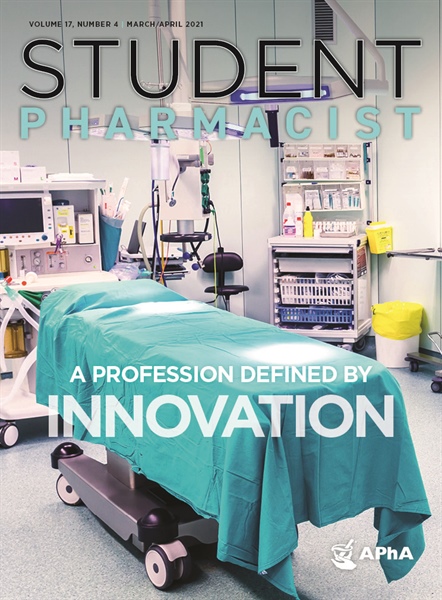
The 7 Habits of Highly Effective Student Pharmacists
Pharmacy school is a time of personal and professional growth. To be successful, you need to have a vision for your future. However, balancing work, family, and school responsibilities; managing personal finances and relationships; setting and achieving academic goals; and maintaining emotional and physical well-being can prove difficult. How can you achieve personal and professional balance and success?
Stephen R. Covey’s The 7 Habits of Highly Effective People addresses this question. I’ve adapted the “7 Habits” to assist you on your journey as a student pharmacist. I hope these habits will inspire your personal and professional growth as you join one of the world’s most trusted health professions.
Habit 1: Be proactive
Take initiative and responsibility for your life, your actions, and your success. You are the architect of your own destiny. How are you spending your time? Does it align with your goals? A proactive student pharmacist plans, reducing risk and stress by avoiding last-minute panics and night-before cramming.
Create your own experiences. Interested in a subject and there is no elective? Ask about an independent study or research opportunity. Perhaps you’ve identified a community need that APhA–ASP is well placed to fill: Bring the right groups together to create meaningful change.
Habit 2: Begin with the end in mind
Have a plan in place. It can and should change over time as you continue to learn and gain new experiences, but you must have an idea of where you want to go. Consider what kind of pharmacy you want to practice. Would you rather work directly with patients, or make decisions for a group? Do you want to pursue postgraduate training or obtain an additional certification? What steps do you need to complete, and what skills do you need to cultivate to get there?
Not sure which path to take? Be curious and ask questions! Ask professors and preceptors about their journey. Challenge yourself through a variety of coursework and extracurricular activities. All experiences hold value, even the ones you didn’t particularly enjoy. Knowing what you don’t like is just as powerful as knowing what you do like. If you start with a clear destination, you can better understand where you are now, where you’re going, and what you value most.
Habit 3: Put first things first
Spend your time on things that are most important to you. Focus first on things that are both important and urgent. This doesn’t mean ignoring all your classes to study for tomorrow’s test. There will be times you have so many things going on you won’t know where to start. Get organized and prioritize your responsibilities. Make short-, intermediate-, and long-term lists, and tackle them accordingly.
Setting priorities, having discipline, and saying no to things that are not important will allow you to live a more balanced life. Time management is a skill that takes time and practice to sharpen. Help yourself succeed by avoiding distractions so you can focus fully on the task at hand. You’ll get your work done more quickly and to a higher standard.
Habit 4: Think win–win
Always work effectively with others to achieve optimal results. This applies in school and in practice. Balance courage for getting what you want with consideration for what others want. Group projects can be challenging if everyone is focused only on what is best for themselves.
When your patients win, you win. Your job is to ensure safe and appropriate medication use. Updating a protocol, finding a more affordable alternative, or optimizing a regimen are all examples. Listen and ask the right questions to find a solution that is best for everyone.
Habit 5: Seek first to understand, then to be understood
“No one cares how much you know until they know how much you care.” To really help others, we need to listen to their ideas and feelings. Listen with the intent to understand, not just to reply. Perhaps you disagree with a question on an exam or don’t understand the logic behind a policy. Create a respectful and empathetic give-and-take environment by taking the time to fully understand issues and providing candid and accurate feedback.
Habit 6: Synergize
Synergizing is about bringing it all together and working well with others. Everyone who successfully completes pharmacy school will receive a PharmD. That doesn’t set you apart. What does make you unique are your extracurricular and cocurricular activities, the skills you have learned, and your experiences: what student organizations you were involved in; how you learned something in class and counseled a patient on it at work the next day; how you worked with a faculty member to implement a new program at their hospital.
We’ve all heard the aphorisms “two heads are better than one” and “the whole is greater than the sum of its parts.” To succeed, one must value others’ strengths and learn from them. Instead of wanting to work only with your friends on class assignments, consider random group assignments as an opportunity to learn from and about classmates. When you identify a problem in practice, work with other professions to find a more effective solution; you are more likely to demonstrate innovative problem-solving skills.
Habit 7: Sharpen the saw
Have a balanced program for self-renewal in the four areas of your life: physical, social/emotional, mental, and spiritual. Preserve and enhance the greatest asset you have—you! While in school, take time to do something for yourself unrelated to pharmacy. Spending your pharmacy school years doing nothing but studying, going to class, eating, and maybe sleeping may get you to graduation, but I guarantee that you won’t be your best self.
Physical improvement activities may be exercise, eating nutritionally dense foods, and resting. Cultivate meaningful social and emotional connections with others. Learning, reading, and writing can renew your mental self. Enhancing your spiritual self may include spending time in nature, serving your community, or engaging in meditation, music, art, or religion.
Enjoy your time in pharmacy school!
Nicole Asal, PharmD, BCPS, is clinical associate professor and APhA–ASP Chapter coadvisor at The University of Rhode Island College of Pharmacy.
Please login or register to post comments.
Our websites may use cookies to personalize and enhance your experience. By continuing without changing your cookie settings, you agree to this collection. For more information, please see our University Websites Privacy Notice .
UConn Today
- School and College News
- Arts & Culture
- Community Impact
- Entrepreneurship
- Health & Well-Being
- Research & Discovery
- UConn Health
- University Life
- UConn Voices
- University News
April 25, 2024 | Taylor Graves - UConn School of Pharmacy
School of Pharmacy Team Wins National AMCP Competition for the Second Year in a Row
A team of four UConn School of Pharmacy students showcased their expertise and emerged winners for the second year in a row at the Academy of Managed Care Pharmacy (AMCP) National Student Pharmacist Pharmacy & Therapeutics (P&T) Competition.
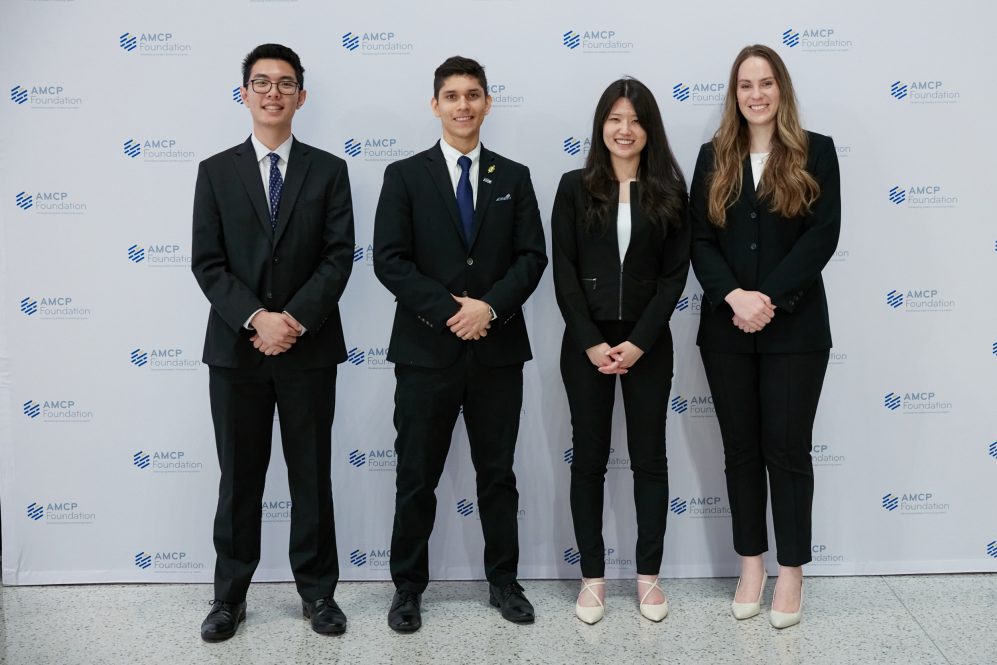
Ryan Shan, Gianni Contrera, Huiqiao (Melinda) Fan, and Janette Wadolowski
The competition, held during the AMCP Annual Meeting in New Orleans on April 16th, brought together the top 5 pharmacy school teams to present their case to a simulated P&T Committee and answer questions.
The competition, known for its innovative approach to developing essential skills in managed care pharmacy, saw teams from across the nation delve into the intricacies of formulary review and management. UConn’s team, comprising Gianni Contrera, Ryan Shan (UConn AMCP Chapter President and P&T Competition Coordinator), Huiqiao (Melinda) Fan, and Janette Wadolowski, demonstrated a comprehensive understanding of clinical and economic evidence analysis, cost-benefit assessments, and business insights in the pharmacy field.
“This is hands-down the most valuable experience I’ve had in pharmacy school,” says Ryan Shan, a second year Pharm.D. student. “Being able to apply what we’ve learned at UConn to tackle a real-world case as a team has been a wonderful opportunity.”
The students’ journey to victory involved rigorous preparation to draft a detailed monograph—a lengthy document encompassing literature search, economic analysis, and conclusive recommendations. They were challenged with articulating how the designated drug should be included in an insurance formulary plan, showcasing not just their clinical knowledge but also their ability to navigate complex healthcare landscapes.
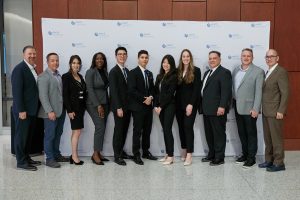
UConn competed among 47 schools and emerged back-to-back champions. This achievement underscores the School of Pharmacy’s commitment to excellence in pharmacy education and its dedication to training well-rounded professionals equipped to tackle the challenges of modern healthcare.
“Watching the student team passionately showcase their work live in front of the judges was incredible,” says Christina Polomoff, faculty liaison for UConn’s AMCP chapter. “This has been one of the most rewarding things to be part of us a faculty member. A special acknowledgement goes to the managed care advisors who have provided support and encouragement for this growing chapter: Jeffrey Casberg, Andrew Cournoyer, Joseph Honcz, Daniel Shan, and Glen Smyth. And a thank you to UConn School of Pharmacy, Dean Philip Hritcko, Associate Dean Nathaniel Rickles, and Department Head Dr. Michael White for their unwavering support.”
Recent Articles
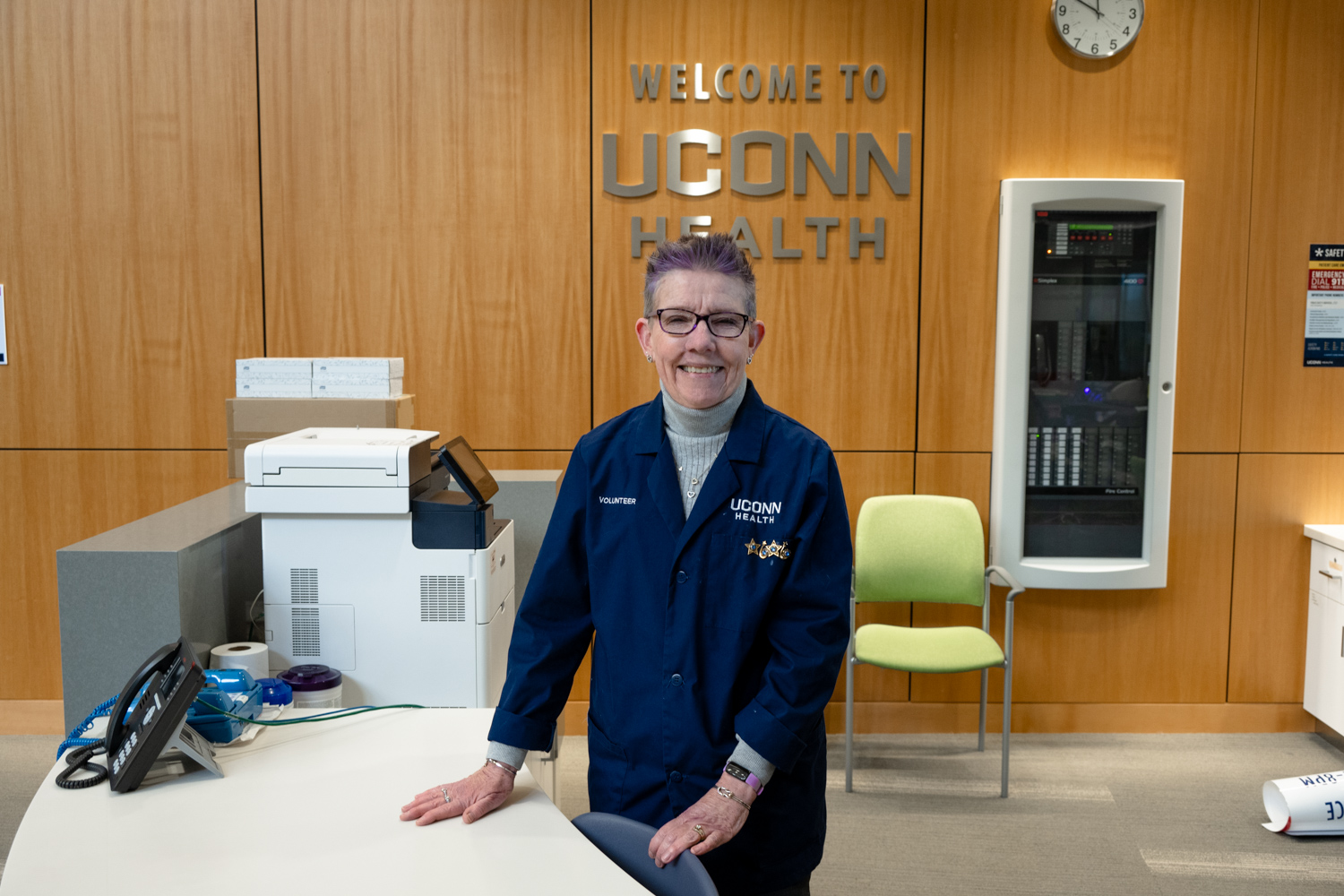
April 25, 2024
‘I Still Have Something to Offer This World’
Read the article

Student Speaker Spotlight: Nuratu Quarshie
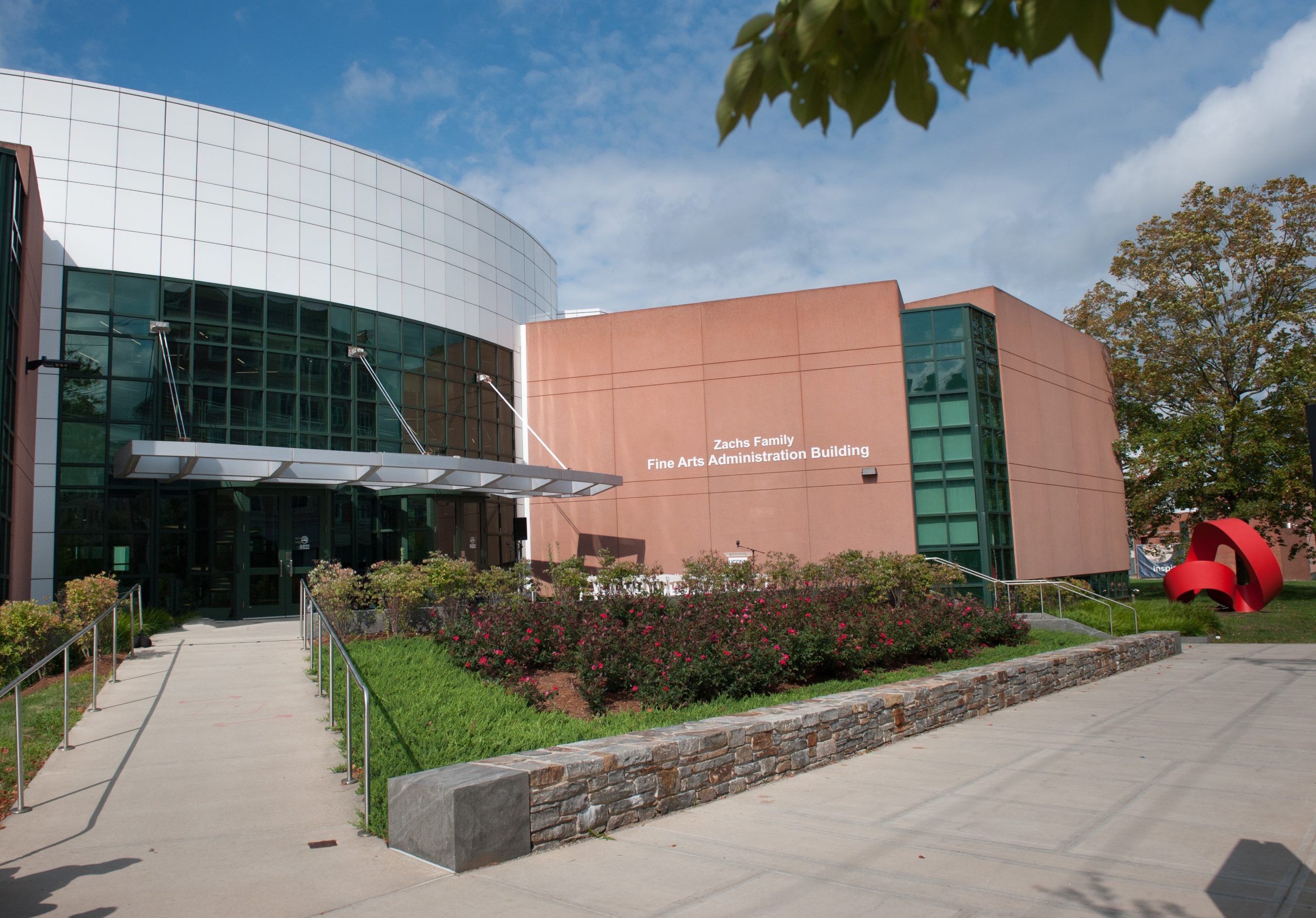
UConn School of Fine Arts Names New Dean
- Washington State University

Celebrating College Excellence 2024
Across Washington State University (WSU) spring is a time to recognize those who go above and beyond, making an impact in their programs, the university, and their communities. Along with the College of Pharmacy and Pharmaceutical Sciences (CPPS) awards, students, faculty and staff are also recognized by the WSU Spokane campus. It is with great pride the college announces the following CPPS faculty, staff, and student student awards as well as WSU Spokane Chancellor’s Excellence Awards received by CPPS students, faculty, and staff.
CPPS Student Awards
CPPS student awards are selected by faculty and staff, recognizing students who have shown a commitment to academic performance, leadership, scholarship, service and professionalism. This year’s recipients received their awards during our recent Celebrating Excellence and Generosity events in Yakima and Spokane. Graduating Doctor of Pharmacy students will receive their awards separately during commencement week celebrations in May.

Rising Star

Excellence in Patient Care and Outreach

Excellence in Leadership

Excellence in Research and Scholarship

Graduate Student of the Year
United states public health service award.
The United States Public Health Service received nominations from across the country of students who demonstrate a strong commitment to public health.

CPPS Faculty and Staff Excellence Awards
The Faculty Excellence Award recognizes two faculty members each year who has exhibited excellence in teaching, scholarship/research, or service, contributions to the community, and has been exemplary in their achievements and performance.

Faculty Excellence Award

CPPS Staff Excellence Award
The Staff Excellence Award recognizes staff who exhibit exceptional work, foster an atmosphere of trust and respect, and serve as effective ambassadors for the college.

Supervisor/Director Staff Excellence

Operations Staff Excellence
Chancellor’s excellence awards.
The Chancellor’s Excellence Awards are bestowed annually to students, faculty, staff and community partners who advance leadership and engagement at WSU Spokane. Recipients of these awards demonstrate exceptional leadership and service to the university and the community and/or support leadership development and engagement of WSU students.
The Chancellor presented the awards during an in-person ceremony in April. The college is pleased to celebrate the following CPPS awardees.
Student Awards

Student Leadership Award

Legacy Award

Community Engagement Award
Faculty & staff excellence awards.

Excellence in Teaching

Excellence in Research

Excellence in Diversity, Equity, and Inclusion

Civil Service Award
We’d also like to recognize, Excellence in Interprofessional Education awardee, Skye McKennon, a class of 2007 pharmacy alumna and Elson S. Floyd College of Medicine faculty member.
- search close Search search
- Academics Overview
- Majors & Programs
- Colleges & Schools
- Career Outcomes & Internships
- Academic Calendar & Resources
- Belmont Online
- Admissions & Aid Overview
- First-Year Students
- Transfer Students
- Graduate & Professional Students
- Adult Degree Students
- International Students
- Military Students
- Life at Belmont Overview
- Student Life & Leadership
- Housing & Dining
- Safety & Security
- Health & Wellbeing
- Student Success & Flourishing
- Spiritual Life
- Graduate Student Life
- Living In Nashville
- Belmont Stories
- About Belmont
- Belmont at a Glance
- Diversity, Equity, Inclusion & Belonging
- Christian Identity
- Our History
- Our Strategic Path to 2030
- Conservation & Sustainability
- University Leadership
- Request Info
- Visit Belmont
- Events Calendar
- Faculty & Staff
- Parents & Family
Opening Doors for Nashville’s Future Pharmacists

April 23, 2024 | by Ryleigh Green
- Pharmacy Workshops
This year, Belmont University’s College of Pharmacy and Health Sciences (CPHS) held a number of pharmacy workshops for high school students from schools across the Metro Nashville area. These students learned about different aspects of a career in pharmacy through a variety of activities and got to tour Belmont's facilities.

The workshops began as a labor of love from Dr. Austin Mondloch, a clinical pharmacist fellow from 2021-2023. “He thought bringing high schoolers in to learn about pharmacies would be a great time,” Fricker said. “It was a wonderful idea.”
They found the events were something they wanted to continue as a way to see if students showed increased interest in studying pharmacy after learning about it first-hand.
The workshops have several parts beginning with students attending a pharmacy profession presentation with Fricker. Next, they are taken to a non-sterile compounding activity where they get to make hand sanitizer and chapstick. They are then given a tour of Belmont’s on-campus pharmacy before returning to the Drug Information Center for a drug information scavenger hunt. Before leaving for the day, they play a final Clue -style game to learn about toxicology.
Because pharmacy is not a common career path to explore in high school, many students are not aware of all facets of the profession. Fricker found that, after being shown some practical examples of what the field holds, interests are piqued, and students become more engaged in the possibility of following that path.
“What I want to do is inspire students,” said Fricker. “One really inspired student makes it all worthwhile.”
Belmont is opening doors to careers that students may not have known about otherwise, offering them the opportunity to explore pharmacy in a new and engaging way. Under the guidance of Fricker, Cook and the CPHS faculty, Nashville’s high schoolers are unlocking passions and learning how to make their new dreams into reality.

Binghamton approves pharmacy technician program microcredential
School of pharmacy and pharmaceutical sciences is lending a helping hand to local students and hospitals.
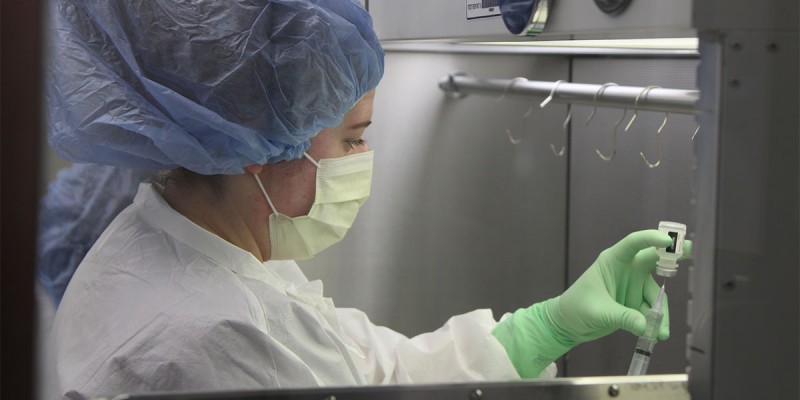
- share via twitter
- share via linkedin
- share via email
Binghamton University has approved a new program through the School of Pharmacy and Pharmaceutical Sciences. The Pharmacy Technician Program Microcredential is a 19-week, 420-hour Binghamton University Microcredential (noncredit) that will prepare graduates to start their career confidently in an expanding healthcare field.
School of Pharmacy and Pharmaceutical Science Dean Kanneboyina Nagaraju originated the program as a way to help not only local hospitals but the community as well. Thanks to a generous grant, the program is free for anyone who wants to enroll. The deadline to enroll is June 1.
“There is an urgent need for pharmacy technicians in Southern Tier healthcare facilities,” he said. “The School of Pharmacy and Pharmaceutical Sciences is excited to offer this program for free to high school students in our area to fill this need. It will help encourage them to pursue a career in healthcare fields, especially pharmacy.”
Some of the requirements to enroll in this program:
- Be at least 18 years old (by July 1).
- Have a high school diploma (by July 1) or high school equivalency diploma or higher.
- Pass a criminal background check and urine drug screening.
Pharmacy technicians play a crucial role in assisting pharmacists in various tasks related to medication dispensing and patient care. In addition to dispensing new prescriptions and refilling orders, packing and labeling prescriptions, preparing sterile and nonsterile compounded medications, tracking medication inventory and processing insurance claims, the role of the pharmacy technician under the supervision of a pharmacist has been expanded in recent years to include medication reconciliation, screening for medication allergies and immunization administration.
For anyone who likes working in a team to care for patients and enjoy customer service, this job may be for you. It also helps you explore other careers in the healthcare field, such as a pharmacist.
“We are excited to partner with local community and hospital pharmacies to both help fill a need in their workforce and expand the interest in pharmacy and pharmacy-related careers locally,” said Sarah Spinler, professor and co-chair of the Department of Pharmacy Practice. “Faculty members Elizabeth Hageman, Kenneth McCall, Nick Schweir and Marissa Langett have been working together as a team for the past year developing our curriculum and admission processes. The microcredential approval is the icing on the cake.”
For 2024, programmatic costs are funded through donations and a grant from the Mother Cabrini Health Foundation. This includes supplies and online access to ASHP’s PharmTech Ready curriculum, which includes online learning lectures, videos and virtual laboratory simulations. These estimated expenses represent a good-faith effort to disclose the true costs of attendance.
I n addition to these expenses, after graduation, there is a $175 one-time fee to the New York State Education Department’s Office of the Professions for pharmacy technician licensure.
“We are excited to identify persons locally who are interested in a high-demand healthcare career and train them to meet our local workforce needs,” said Kenneth McCall, program director, co-chair and clinical professor of pharmacy practice.
Related Stories
An official website of the United States government
The .gov means it’s official. Federal government websites often end in .gov or .mil. Before sharing sensitive information, make sure you’re on a federal government site.
The site is secure. The https:// ensures that you are connecting to the official website and that any information you provide is encrypted and transmitted securely.
- Publications
- Account settings
Preview improvements coming to the PMC website in October 2024. Learn More or Try it out now .
- Advanced Search
- Journal List
- Am J Pharm Educ
- v.77(2); 2013 Mar 12
Pharmacy Students’ Application of Knowledge From the Classroom to Introductory Pharmacy Practice Experiences
Objective. To determine whether and how pharmacy students used knowledge learned in the classroom during their introductory pharmacy practice experiences (IPPEs) in community and hospital settings.
Design. To reinforce course concepts and make connections between coursework and practice, students documented examples of how knowledge from first-year courses was used in IPPEs.
Assessment. Data submitted were categorized by classroom-based pharmacy course, including the frequency with which each course was cited. For community practice experiences, most student examples of knowledge application related to the self-care therapeutics course, pharmacy practice laboratory course, and dose form/compounding laboratory courses. Hospital IPPE examples were most frequently based on the pharmaceutical calculations course, physiology/pathophysiology course, medicinal chemistry course, and pharmacy practice laboratory course.
Conclusion. All prior classroom-based pharmacy courses were cited by students as being useful during IPPEs, although some were more frequently cited than others. This activity provided useful programmatic assessment data.
INTRODUCTION
Comprising approximately one-third of the pharmacy curriculum, experiential learning courses represent an important component of each student pharmacist’s education. In addition to providing opportunities to apply knowledge, skills, and behaviors, these experiences should also allow students to make connections between classroom coursework and the practice environment. The Accreditation Council for Pharmacy Education standards state that “pharmacy practice experiences must integrate, apply, reinforce and advance the knowledge, skills, attitudes and values developed through the other components of the curriculum.” 1 Further, Appendix C of the standards, which provides additional guidance on pharmacy practice experiences, states that pharmacy practice experiences should be “carefully coordinated with other components of the curriculum.” 1
Reinforcing and integrating classroom course content, as well as creating opportunities for explicit connections between classroom coursework and practice experiences, may be especially beneficial or necessary for students participating in introductory pharmacy practice experiences (IPPEs) because these experiences are dispersed throughout the classroom course curriculum and provide a natural opportunity to make linkages (vs being a capstone experience at the conclusion of the curriculum); and because students at earlier stages in the curriculum may have a limited view of how coursework and practice experiences are connected. For example, as students progress through the curriculum, they often have less difficulty understanding how they will apply content from a therapeutics course to the practice of pharmacy, but may have more difficulty understanding how courses earlier in the curriculum (eg, foundation courses in pharmaceutical sciences) have relevance or relate to pharmacy practice.
Other educators have described the difficulty that students have in applying pharmaceutical science concepts to the patient care environment. 2,3 Interventions to help facilitate this connection have been successfully used within the classroom environment. Brown and colleagues described a curricular-wide patient care project that linked 8 primarily basic-science courses with assignments facilitated through a volunteer patient. 2 Another study looked at an integrated “crossover” assignment between a pharmaceutics and pharmacy practice course to emphasize the relevance of basic science in practice. 3
Recognizing the potential for students to underestimate the value of foundation courses, a goal in designing the University of Wyoming IPPE program was to facilitate connections between classroom and experiential learning occurring early in the curriculum. This was accomplished by designing an activity and giving students the responsibility for documenting explicit connections between pharmacy foundation courses and practice.
Other colleges and schools of pharmacy have found value in creating IPPE assignments that had purposeful links between classroom course content and the practice experience environment or in having students reflect on how classroom learning related to their IPPEs. 4,5 One school created case-based “learning bridge” assignments that IPPE students completed with preceptor guidance while on a practice experience. 4 These assignments were designed to reinforce classroom course content for students as well as make preceptors more aware of the curriculum. 4 As part of another study, investigators had IPPE students reflect on how classroom instruction received in specific courses prepared them for practice experience activities and then documented each course the students mentioned. 5 Another pharmacy program had IPPE students document achievement of CAPE competencies throughout their practice experiences. 6 While a list of classroom courses cited as a source of knowledge or preparation for introductory practice experiences has been published, 5 the actual context for how classroom coursework is used by pharmacy students has not been described.
This paper will discuss an IPPE assignment that required students to document how classroom course content had been used in the practice experience environment. The purpose of this study was to describe how students used classroom course content in IPPEs and determine if there was a difference between the content used in community and hospital practice experiences. A secondary purpose was to review student responses and provide this assessment data to the school and first-year (P1) instructors.
A major component of the IPPE sequence at the University of Wyoming is the two 4-week practice experiences in hospital and community pharmacy practice, respectively. Both IPPEs are completed in the summer following the P1 year for a total of 320 contact hours (160 hours each in hospital and community pharmacy practice). The IPPEs at the University of Wyoming have been in place since summer 2007.
The final grade for each IPPE was determined by combining the student’s grade on the evaluation submitted by the site preceptor using a standardized evaluation form (70%), and a series of graded assignments submitted to the school’s experiential faculty members (30%). These assignments given by the school were in addition to any assignments provided by the preceptor. The purpose of the school-initiated assignments was to motivate students to play a more active role in their learning and build direct links between prior coursework and experiences during IPPEs. Completed assignments were submitted to the experiential director/course instructor for grading via an online course management tool. Assignment feedback and grades were communicated back to the student using the same online course management tool. While this study focused on the classroom/practice experience linking assignment, Table 1 provides a list of all assignments completed during the IPPEs in community and hospital practice and the corresponding percent of overall grade.
Assignments for Community and Hospital Practice Experiences

First-year pharmacy students took 9 classroom-based courses, 2 laboratory courses, and a 1-credit-hour survey course exploring the various roles pharmacists have in the healthcare system ( Table 2 ). Students also participated in their first IPPE, which involved shadowing a P4 student on 3 different practice experiences and undergoing orientation for their first practice experiences in community and hospital practice.
Classroom and Laboratory Courses Taken by First-Year Pharmacy Students Prior to Beginning Their Introductory Pharmacy Practice Experiences

During their subsequent community and hospital IPPEs, students were given an assignment that asked them to make explicit connections between the first year classroom/laboratory courses and situations encountered during their practice experiences. During each practice experience, IPPE students had to provide examples of these connections between 6 of the P1 courses and IPPE activities. (The P1 IPPE course and the “Role of the Pharmacist in Health Care” course were excluded from the assignment because the content of these courses is primarily experiential or informational.) Students were instructed to be specific, provide the context of the clinical situation or event that occurred during the practice experience, what they learned in the classroom course, and how it related to the practice experience activity described. Because the experiential faculty members grading the assignment did not necessarily know the exact content covered in every course the students had completed, students were advised to incorporate information about relevant course content in their examples. Vague examples such as, “I calculated a creatinine clearance” were not sufficient because the clinical situation surrounding the calculation and how it related to concepts learned in the classroom were not discussed.
ASSESSMENT AND EVALUATION
An assessment was designed to determine how well students connected or linked their classroom course instruction with practice experiences. An initial assessment from the first year of practice experiences (2007) was undertaken in 2008. 9 This analysis was then augmented with data from practice experiences occurring in 2010 and 2011. All student submissions were reviewed by the course instructor and categorized by classroom course. Because students were not required to document examples for every P1 course, the frequency with which students provided evidence for each course was determined. Chi-square analysis was used to determine if there was a difference in the frequency of reported course content between hospital and community IPPEs. To provide feedback and information regarding how students used content from each course, a compilation of documented examples from each course was forwarded to the appropriate P1 instructors, including those instructors who were not part of the school (eg, biochemistry and integrative physiology instructors).
Students met the expectations of the assignment and the average score for each year’s assignments was over 90%. Some students chose to provide several examples for each course and a few provided more than the 6 required examples. In reviewing data from 2007, 2010, and 2011, (years 1, 4, and 5, respectively) students provided over 1600 examples denoting how course concepts from first-year classroom courses were used during community and hospital IPPEs. Table 3 delineates the examples provided for the community IPPE. In this practice environment, nearly every student gave an example relating to a self-care (nonprescription) therapeutics course, pharmacy practice laboratory course, and dose form design/compounding laboratory course. Students were less likely to provide examples for physiology/pathophysiology, drug use process, biopharmaceutics/pharmacokinetics, and biochemistry.
Number of Documented Examples Linking Knowledge Learned in First-Year Pharmacy Classroom Courses to Community Introductory Pharmacy Practice Experiences

Classroom course connection examples relating to hospital IPPEs are provided in Table 4 . Students, on average, provided the greatest number of examples for pharmaceutical calculations, physiology/pathophysiology, medicinal chemistry, and pharmacy practice laboratory. Similar to the community practice experience, students provided fewer examples for drug use process and biochemistry. In contrast to the community practice experience where self-care (nonprescription) therapeutics was the example most frequently used, self-care represented only 6% of the examples provided for hospital practice experiences. The pharmacy practice laboratory course and pharmaceutical calculations course were the 2 courses for which the most examples were cited between both practice experiences ( Table 5 ).
Documented Examples Linking Knowledge Learned in First-Year Pharmacy Classroom Courses to Hospital Introductory Pharmacy Practice Experiences

Summary of Examples Documenting Application of Course Knowledge in Community and Hospital Introductory Pharmacy Practice Experiences

Chi-square analysis was used to determine if there was a difference in the frequency of reported course content between hospital and community IPPEs. There was a significant difference in the classroom coursework used and documented by students participating in community versus hospital IPPEs p < 0.001). When analyzing the basic science courses alone, there was also a difference in the courses documented during community vs hospital IPPEs ( p < 0.001). The difference persisted when analyzing only clinical/social science courses ( p < 0.001).
In addition to reviewing frequency data, the content of responses was also analyzed for 1 pharmacy practice course and 1 pharmaceutical science course for 2011 practice experiences. In examples relating to the self-care therapeutics (nonprescription) course, students addressed over 30 different health conditions (eg, allergic rhinitis, pain). In reference to the medicinal chemistry course, students discussed 16 different therapeutic categories (eg, antibiotics, anticoagulants), as well as general topics (eg, drug interactions, mechanism of action, intravenous compatibility).
Students’ responses varied. A representative sample student response for the biopharmacetuics/pharmacokinetics that met the criteria for the assignment and was given full credit is provided in Appendix 1 .
While obtaining student perceptions can be useful, for this particular assignment it was not a primary focus. However, student feedback was obtained in 2010 for all assignments completed during community and hospital IPPEs. Questions relating to the assignment are shown in Table 6 . Ninety-one percent of responding students agreed that completing this assignment made them aware of how P1 coursework was applicable to pharmacy practice; 86% believed that all practice experience assignments were relevant to their education.
Student Perceptions Relating to the Classroom/Practice Experience Linking Assignment a

The purpose of this study was to determine whether and how students applied knowledge they learned in the classroom during their IPPEs and if there was a difference between the courses students credited with providing knowledge used in community and hospital practice experiences. In addition, responses were intended to provide assessment data for the school and P1 instructors.
Students were able to articulate how they used prior classroom course concepts in IPPEs. Despite the instructor’s perception and concern that students may have been taking their knowledge learned in the classroom for granted, when asked, they were able to provide solid examples and link their classroom coursework with both the community and hospital practice environments. While students were more apt to provide examples of applied knowledge from some courses more than others, examples were generally distributed among all course types, demonstrating that students were using all prior coursework in the practice environment. There was a significant difference between the classroom course examples given for the hospital and community IPPEs.
Not surprisingly, students were able to make the most connections with the self-care (nonprescription) course, pharmacy practice laboratory course, and dose form design/ laboratory course while completing their community pharmacy practice experience. The community practice environment is rich with opportunities for pharmacists and student pharmacists to assist patients with self-care needs. Student examples included a variety of health conditions including allergic rhinitis, fungal infections, sunburn, musculoskeletal pain, and pediatric dosing recommendations. It is also intuitive that students were able to easily document content examples from the pharmacy practice laboratory as this course provided practical knowledge about the actual mechanics of filling prescriptions, legal considerations, and learning opportunities to assist patients with targeted health conditions like diabetes, asthma, and hypertension. In the state of Wyoming, pharmacy interns can transfer prescriptions, so many students talked about how learning to do this in the pharmacy practice laboratory course helped them complete this activity during their practice experience. Other students talked about being able to read and interpret prescriptions and having the baseline drug knowledge to successfully fill prescriptions. Many of the examples related to the dose form design course described the students’ abilities to compound various products in the community pharmacy as a result of what they had learned and practiced in the laboratory component of the course.
One of the most striking findings of this study related to the medicinal chemistry course. The drug knowledge learned in the medicinal chemistry course appeared to be instrumental in helping students counsel patients and recognize drugs and drug classes. In contrast, it is unusual to find students at the end of the curriculum who would single out medicinal chemistry as a key component used in providing patient care. At the end of their education, much of pharmacy students’ drug knowledge is integrated from the array of courses taken, with therapeutics courses serving as the primary vehicle to integrate this knowledge. Therefore, IPPE students’ reliance on course concepts taught in medicinal chemistry to help them remember important counseling points for certain antibiotics, for example, was enlightening. The students’ ability to use and recognize the value of this course content may also be attributable to the teaching techniques used in the course.
In the hospital environment, over 80% of students provided examples of using knowledge gained from their pharmaceutical calculations, physiology/pathophysiology, medicinal chemistry, pharmacy practice laboratory, and biopharmaceutics/pharmacokinetics courses. On hospital practice experiences, students were frequently involved in calculating drug dosages and monitoring drug therapy, which have direct applications to calculations and biopharmaceutics/pharmacokinetics courses. Examples of using knowledge from physiology/pathophysiology courses were more often cited for hospital than community practice experiences, which likely correlates with the acute presentation of a variety of diseases seen in that IPPE. In the pharmacy practice laboratory course, students have a session on intravenous preparation, and IPPE students often cited using the intravenous compounding skills learned in that course during their hospital practice experience.
Similar to findings described by Wuller, 5 these data are useful from an assessment perspective by demonstrating that students are able to draw upon classroom coursework in the experiential environment and that they are prepared to encounter situations presented in community and hospital pharmacy practice environments. Assignment data also provided evidence that the school is meeting accreditation standards by having pharmacy practice experiences that are coordinated with and help reinforce classroom-based curricular components. A content analysis of the examples provided for the self-care therapeutics course found that students are being exposed to and assisting patients with a variety of health conditions. In addition, learning how students use course concepts in the introductory practice experience environment can be useful to P1 course instructors. This information may be especially helpful because courses taught earlier in the curriculum may get less feedback on exit surveys at the end of the curriculum because students may remember fewer specifics from the courses or overlook how foundational content contributed to their current knowledge base.
The classroom/practice experience linking assignment was relatively easy to implement and grade. Pharmacy class sizes at the University of Wyoming are small (52 students/class), so the grading process would be a greater burden for colleges and schools with larger class sizes. Collating student response data was the most time-consuming process because it necessitated copying and pasting from each student submission. By sampling data at 3 points in time, this study confirmed that students are documenting content from a variety of P1 courses. Therefore, determining the frequency with which students use knowledge learned in each P1 course on their IPPEs will not be done on an annual basis. The assignment itself, however, will be continued annually because it is perceived to be valuable for students, P1 instructors, and the school’s assessment committee. A more efficient method of capturing and sharing examples of student application of knowledge learned with P1 course instructors is being developed using E*Value (Advanced Informatics, Minneapolis, MN), the school’s practice experience management system.
CONCLUSIONS
As part of their community and hospital IPPEs, P1 pharmacy students were able to apply knowledge previously learned in the classroom and recognize this connection. Challenging students to think about and provide specific examples of knowledge application made the connections more explicit. It also allowed students to see the relevance of the classroom portion of their education and reinforced how foundational course concepts are directly applicable to pharmacy practice. An exercise such as the one described also can be a useful component in a pharmacy college or school’s assessment program.
Appendix 1. A representative sample student response for the biopharmacetuics/pharmacokinetics, which met the criteria for the assignment and was given full credit.
“During my rotation at XXX Hospital I had the opportunity to apply Biopharmaceutics and Pharmacokinetics to many aspects of the job. On a daily basis I would calculate the creatinine clearance for each patient in the hospital as we had been taught during Biopharmaceutics. For example, one female patient weighed 84.5kg, was 66 inches tall, and had a serum creatinine of 0.9. Using the Cockcroft-Gault equation, [(140-Age)(Weight in KG)/(72xSrCr)](0.85), and taking into account her ideal body weight as well as adjusted body weight, I found this particular patient's creatinine clearance to be 58ml/min. Not only did I have the chance to monitor patients’ renal function, but I also had the opportunity to dose patients appropriately in accordance with their renal function. I had a clear understanding of the importance of this because biopharmaceutics really drilled into us how the kidneys affect the bioavailability of certain drugs.”
ENHANCED BY .st0{fill:#ea4335}.st2{fill:#4285f4}
New nanomaterial could advance neurodegenerative disease treatments.
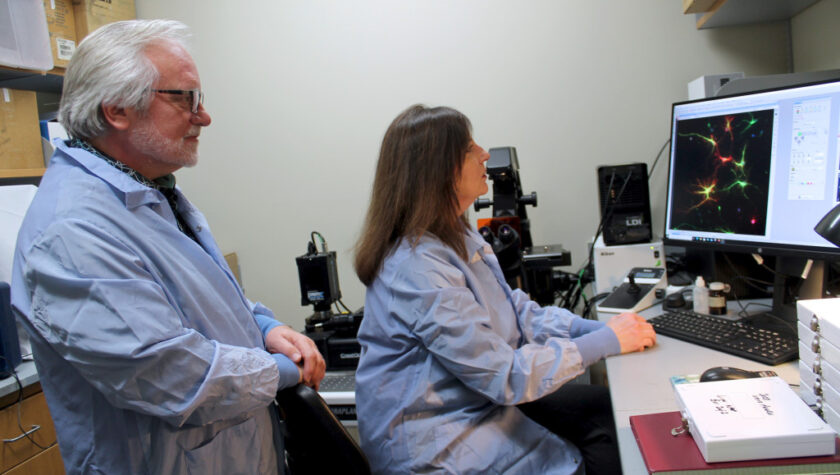
By Will Cushman
This article originally appeared on uw–madison’s news page..
A newly developed nanomaterial that mimics the behavior of proteins could be an effective tool for treating Alzheimer’s and other neurodegenerative diseases. The nanomaterial alters the interaction between two key proteins in brain cells — with a potentially powerful therapeutic effect.
The innovative findings, recently published in the journal Advanced Materials , were made possible thanks to a collaboration between University of Wisconsin–Madison scientists and nanomaterial engineers at Northwestern University.
The work centers around altering the interaction between two proteins that are believed to be involved in setting the stage for diseases like Alzheimer’s, Parkinson’s and amyotrophic lateral sclerosis, or ALS.
The first protein is called Nrf2, a specific type of protein called a transcription factor that turns genes on and off within cells.
One of Nrf2’s important functions is its antioxidant effect. While different neurodegenerative diseases result from separate disease processes, a commonality among them is the toxic effect of oxidative stress on neurons and other nerve cells. Nrf2 combats this toxic stress in brain cells, helping to stave off disease.
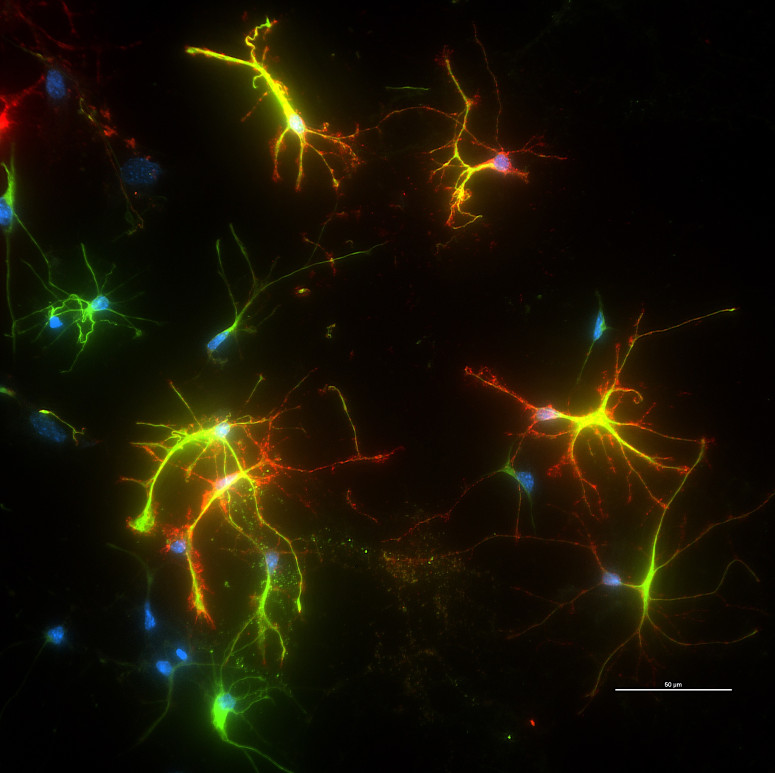
Jeffrey Johnson , a professor in the UW–Madison School of Pharmacy, has been studying Nrf2 as a promising target for treating neurodegenerative diseases for decades alongside his wife, Delinda Johnson , a senior scientist at the pharmacy school. In 2022, the Johnsons and another group of collaborators found that increasing Nrf2 activity in a specific cell type in the brain, the astrocyte, helped protect neurons in mouse models of Alzheimer’s disease , leading to significantly less memory loss.
While this previous research suggested that increasing Nrf2’s activity could form the basis of an Alzheimer’s treatment, scientists have found it challenging to effectively target the protein within the brain.
“It’s hard to get drugs into the brain, but it’s also been very hard to find drugs that activate Nrf2 without a lot of off-target effects,” says Jeffrey Johnson.
Enter the new nanomaterial. Known as a protein-like polymer, or PLP, the synthetic material is designed to bind to proteins as if it were itself a protein. This nano-scale imitator is a product of a team led by Nathan Gianneschi, a professor of chemistry at Northwestern and faculty member at the university’s International Institute for Nanotechnology .
Gianneschi has designed multiple PLPs to target various proteins. This particular PLP is structured to alter the interaction between Nrf2 and another protein called Keap1. The proteins’ interaction, or pathway, is a well-known target for treating many conditions because Keap1 essentially controls when Nrf2 responds to — and combats — oxidative stress. Bound together under unstressed conditions, Keap1 releases Nrf2 to do its antioxidant work when needed.
Gianneschi and the Johnsons were connected via Robert Pacifici, chief science officer at the CHDI Foundation , which funds research aimed at treating Huntington’s disease, another neurodegenerative condition. The foundation has funded both the Johnsons’ and Gianneschi’s work in the past.
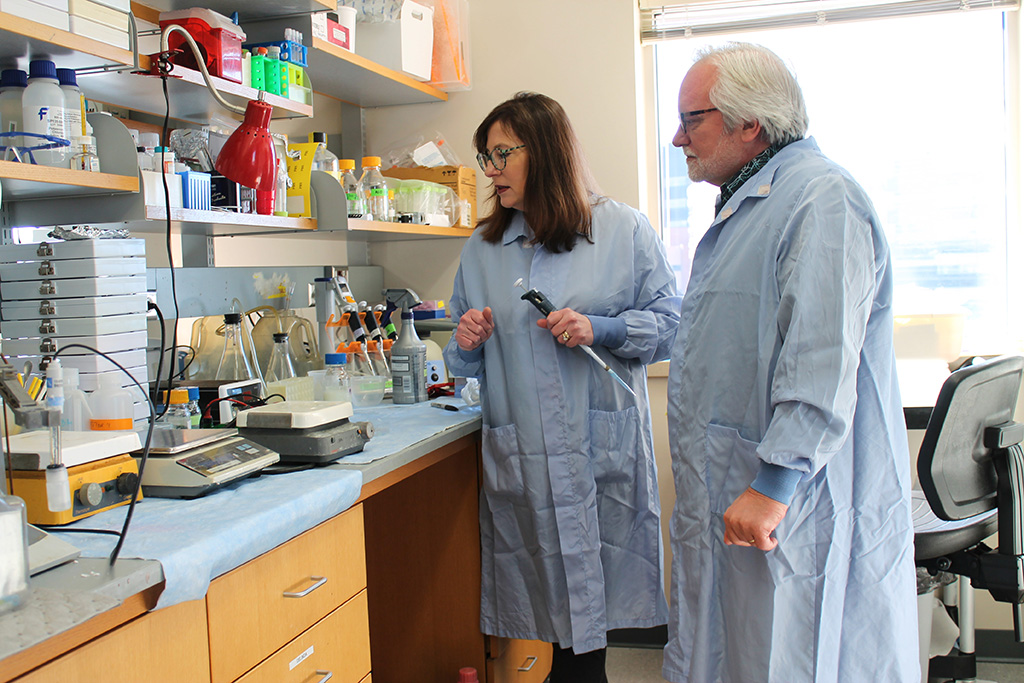
“Just in passing, Nathan and his colleagues at Grove Biopharma, a preclinical biotech startup focused on therapeutic targeting of protein-protein interactions, said to Robert that they were thinking about moving to target Nrf2,” says Johnson. “And Robert said, ‘If you’re going to do that, you should call Jeff Johnson.’”
Soon, the Johnsons and Gianneschi were discussing the possibility of the UW–Madison lab providing mouse model brain cells needed to test Gianneschi’s protein-like nanomaterial.
Jeffrey Johnson says he was initially somewhat skeptical about the PLP approach, given his unfamiliarity with it and the general difficulty of precisely targeting proteins in brain cells.
“But then one of Nathan’s students came up here with it and put it on our cells, and I’ll be damned if it didn’t work really well,” he says. “We really dove into it then.”
The resulting research showed that Gianneschi’s PLP was very effective at binding to Keap1, which freed up Nrf2 to accumulate in cells’ nuclei, amping up its antioxidant function. Importantly, it did so without causing the unwanted off-target effects that have hampered other strategies aimed at better activating Nrf2.
While that work was performed in cells in culture, the Johnsons and Gianneschi are now taking it a step further in mouse models of neurodegenerative diseases. It’s a line of research that they hadn’t expected to be involved in but are now excited to be pursuing.
“We don’t have the expertise in biomaterials,” says Delinda Johnson. “So getting that from Northwestern and then moving forward on the biological side here at UW shows that these types of collaborations are really important.”
Keep Reading

Boosting One Gene in the Brain’s Helper Cells Slows Alzheimer’s Progression in Mice
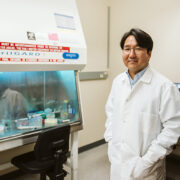
Designing a Better Approach to Monitor Cancer

School News
UW–Madison School of Pharmacy Attains Top Residency Match Rate
April 15, 2024
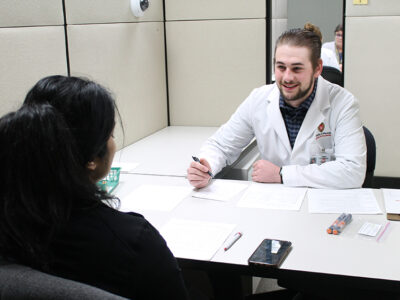
Empathy in Practice
March 14, 2024
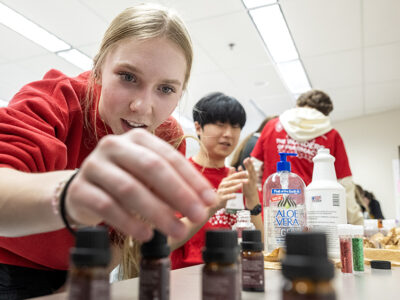
Unveiling the Wonders of Pharmacy
Tara Buzinski Awarded Curci Foundation Fellowship
College of pharmacy, student tools, graduate studies, faculty resources, research departments, research centers.
Congratulations to Molecular Pharmaceutics PhD student Tara Buzinski ( Kramer Lab ) for receiving a prestigious Shurl and Kay Curci Foundation Fellowship !
The Foundation partners with the University of Utah to support students pursuing Ph.Ds in life sciences, prioritizing two groups that have been historically overlooked for financial support: women and international students. The Curci fellowship provides each recipient with two years of graduate school funding (stipend, graduate tuition, and health insurance). They support science-based research striving for the advancement of a healthy and sustainable future for humans.
Tara received her BS in Chemical Engineering at the Colorado School of Mines. Her PhD research will focus on Engineering and characterizing antifreeze glycoproteins. She is looking forward to learning new synthetic techniques and working with Dr. Kramer to contribute to our knowledge of glycoproteins and their role in cryopreservation. Tara is grateful to the Shurl and Kay Curci Foundation for supporting her research and education!

- Pharmaceutics

Why Pharmacy Students Should Master Their Writing Skills
Pharmacy students are taught the importance of communication skills throughout their education.
Pharmacy students are taught the importance of communication skills throughout their education. When students are visualizing a career as a pharmacist, it’s easy to understand why communication matters: Whether pharmacists are counseling patients in a retail pharmacy, working with other health care providers in a hospital, or presenting a business plan in a corporate setting, it’s important that they effectively share messaging with others.
But there’s another form of communication that’s just as important for pharmacy students to master: writing. While writing may be less popular than math and science among those who often pursue pharmacy careers, it is an essential skill for success in any field of pharmacy. It is crucial that pharmacy schools focus on the development of writing skills when cultivating future pharmacists.
An Essential Practice
College students in any field of study often have assignment grievances along the lines of “I’m never going to need to know this in real life” or “I’ll never actually do this in my career.” Pharmacy students may share these sentiments about writing assignments. This is a huge misjudgment, and such thinking could be detrimental to professional success. According to The Pharmacy Student Survival Guide, Third Edition , “writing is the vehicle that drives pharmacy practice, regardless of practice type or setting.” 1 The book goes on to list 3 reasons why writing is essential in the practice of pharmacy.
First, writing is often the catalyst for action in health care. 1 Pharmacists are frequently identified and reimbursed for activities initiated by written documents; such activities include updating patient records, communicating with insurers, and answering drug information questions. Second, writing provides much stronger legal standing than verbal communication. 1 Quality written records can ensure long-term success for pharmacists, especially when it comes to compliance and liability issues. Third, writing is increasingly important as new technologies continue to emerge in health care. 1 With health care communication existing largely in electronic medical records and through digital platforms, it is essential that pharmacists write clearly and effectively.
Works by Pharmacists
What types of documents are pharmacists writing? In the article “Improving and Assessing Writing Skills and Practices of Pharmacy Students,” Suleiman I. Sharif and Rana Ibrahim suggest a variety of such documents. “Pharmacists have many duties that include writing, such as writing annual reports assessments, letters to editors in journals, letters of recommendations, articles to be published, or proposals for new clinical services,” they explain. 2
Additional examples include care plans, progress notes, treatment guidelines, pharmacy and therapeutics formulary reviews, drug information reviews, newsletters, patient education handouts, and pharmacy legislation reviews. When students consider such examples, they quickly realize that good writing skills are an essential job function for any pharmacist, in any area of practice.
Benefits Beyond Writing
Pharmacists who exhibit exemplary writing skills benefit in other ways. Developing writing skills improves critical thinking, another key skill for pharmacists in any role. The process of writing lets students evaluate information from a variety of sources to produce tangible evidence of their knowledge, as well as to refine ideas, prioritize information, understand opposing viewpoints, and explain complex topics. By honing their writing skills, pharmacy students develop a host of secondary skills required for their practice.
Additionally, professionals in any field are often evaluated through written contributions and publications, and pharmacy is no exception. Writing and publishing allow pharmacists to share their newly discovered insights and details on professional advancements with their peers.
Lastly, when pharmacists have strong writing skills, patients benefit. Many of the documents by pharmacists listed above are direct pieces of patient care. Consequently, good writing contributes directly to positive patient outcomes, the ultimate goal of any health care professional.
With these benefits in mind, it’s easy to understand why writing is so important for pharmacy students. Pharmacy schools aiming to prepare future pharmacists for practice should focus on developing not only verbal communication skills but written ones as well.
Kristin O’Donovan is a 2018 PharmD candidate at the Butler University College of Pharmacy & Health Services in Indianapolis, Indiana .
- Assa-Eley M, Ward T, Hobson E. Communication: an overview. In: Nemire R, Kier K, Assa-Eley M, eds. The Pharmacy Student Survival Guide, Third Edition . New York, NY: McGraw-Hill, 2014. accesspharmacy.mhmedical.com.ezproxy.butler.edu/content.aspx?bookid=1593§ionid=99823778.
- Sharif S, Ibrahim R. Improving and assessing writing skills and practices of pharmacy students. J Pharma Care Health Sys. 2014;1:e105. doi: 10.4172/jpchs.1000e105 .
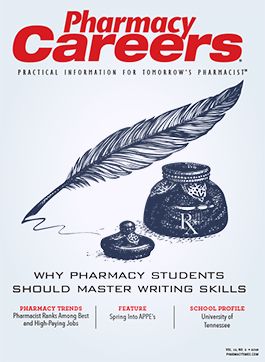
OPC Summer 2024: Connecting Oncology Pharmacists With Cutting-Edge Insights and Opportunities to Collaborate
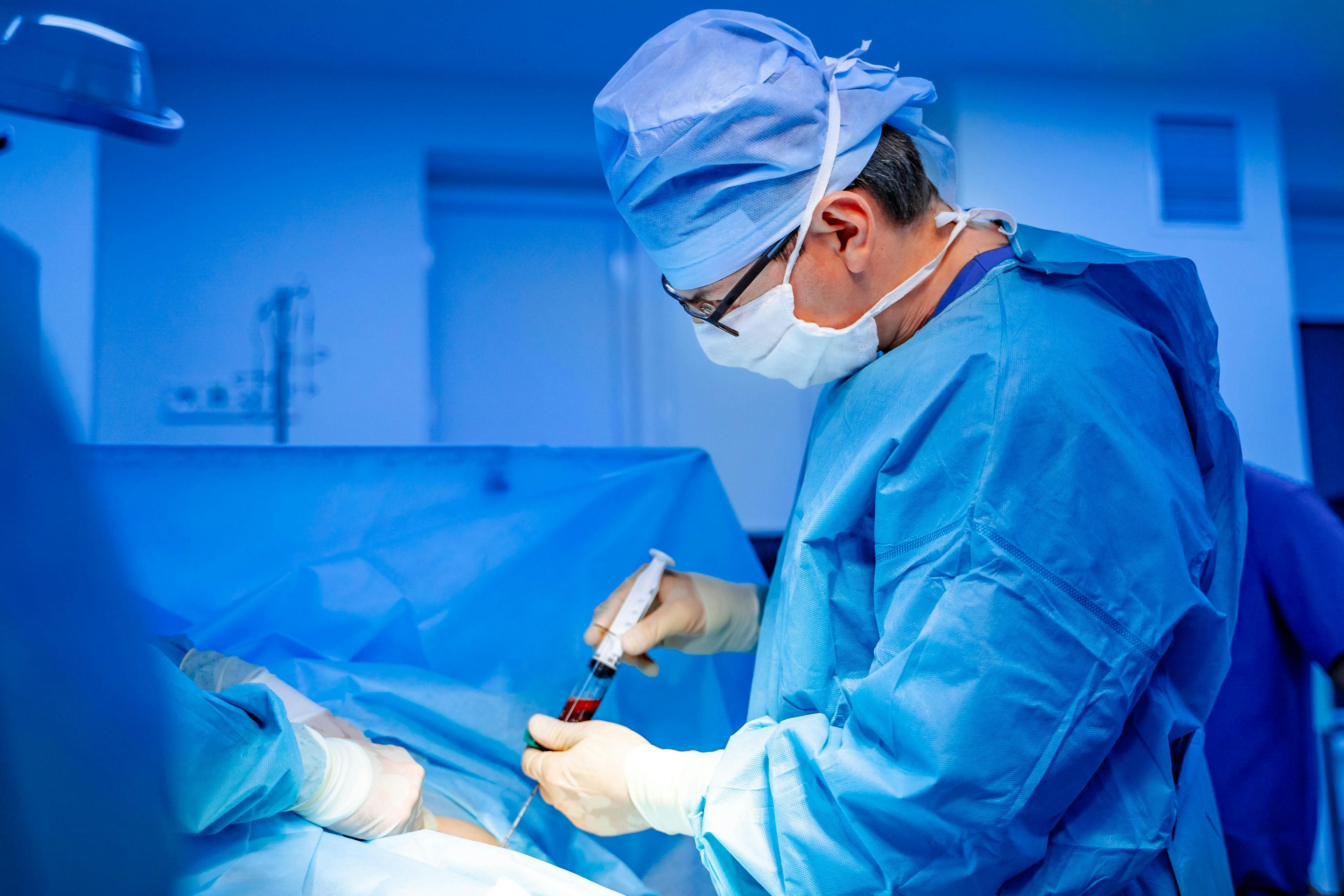
Advancement in Stem Cell Transplantation: Improving Outcomes for Patients With Blood Cancer
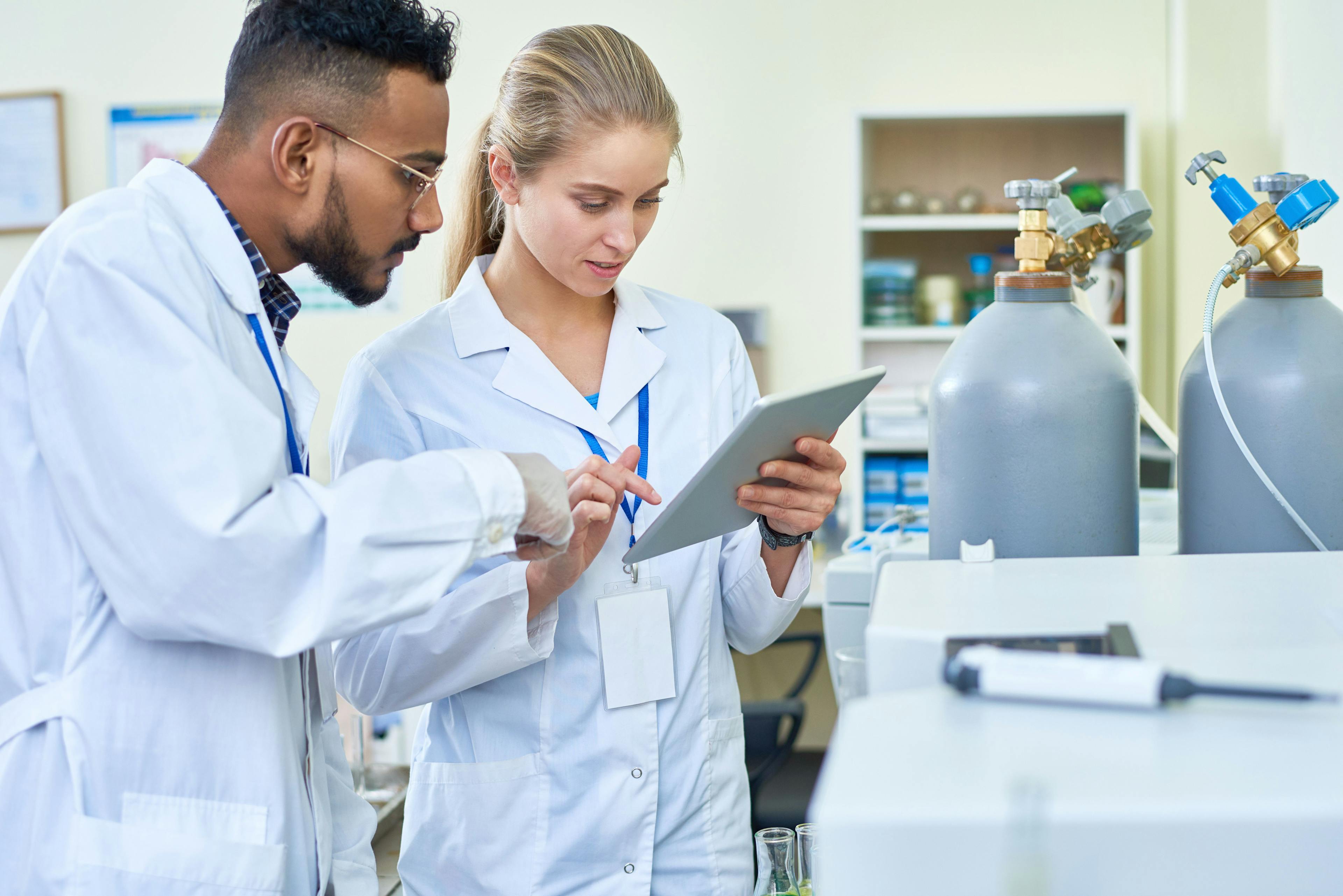
Advocate for Greater Pharmacy Technician Roles
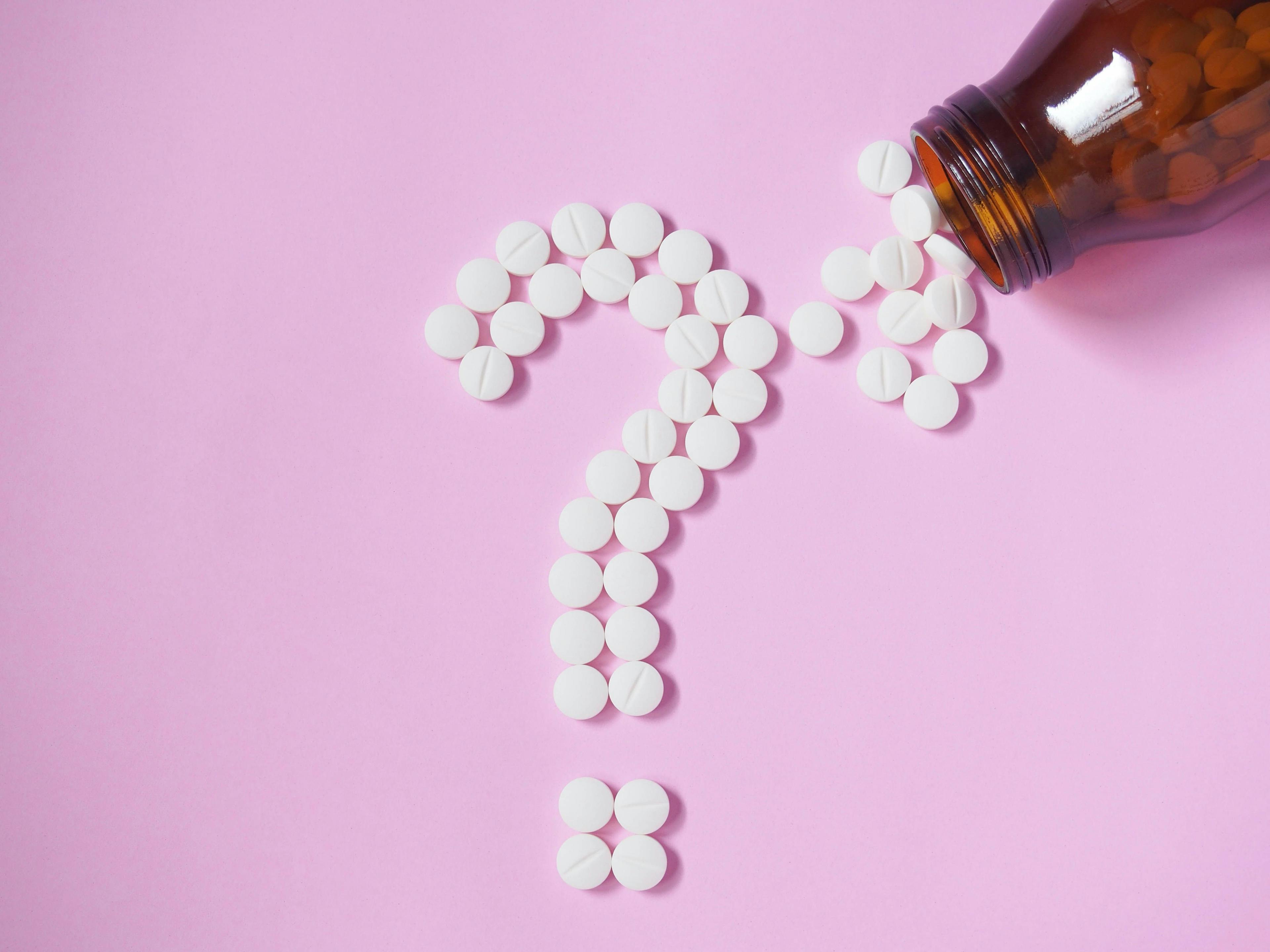
Accurate, Complete Data Entry Is Key to Medication Safety

Optimizing Oncological Care: The Influence of AI on Insurance Approvals
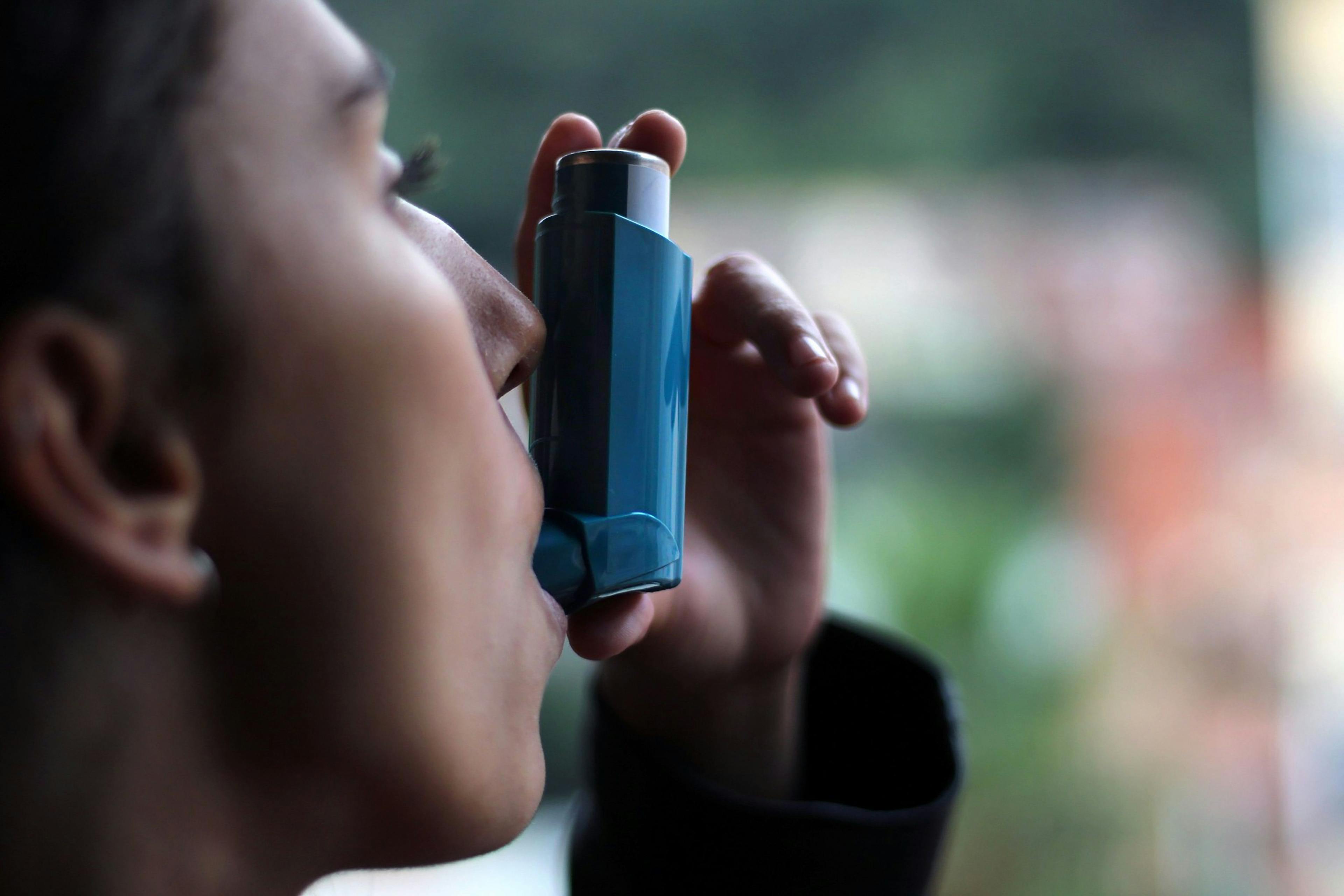
Condition Watch: Asthma
2 Commerce Drive Cranbury, NJ 08512
609-716-7777

OHSAA announces 2024 football divisional assignments: Who’s on the move?
- Updated: Apr. 25, 2024, 5:49 p.m. |
- Published: Apr. 25, 2024, 3:48 p.m.
- Matt Goul, cleveland.com
COLUMBUS, Ohio — Defending state football champion Perry is moving up to Division IV for the 2024 season.
Could it end up meeting Glenville at some point in the playoffs? Both defending champs are now in the same classification after the Ohio High School Athletic Association unveiled its new divisional alignments for this fall, following approval Thursday by its board of directors.
Recommended high school sports stories
- Who is the top baseball outfielder in NE Ohio? Our picks, your votes Apr. 25, 2024, 10:05a.m.
- Who is the top baseball infielder in NE Ohio? Our picks, your votes Apr. 25, 2024, 6:05a.m.
- Who is the top baseball pitcher in NE Ohio? Our picks, your votes Apr. 24, 2024, 6:05a.m.
If you purchase a product or register for an account through a link on our site, we may receive compensation. By using this site, you consent to our User Agreement and agree that your clicks, interactions, and personal information may be collected, recorded, and/or stored by us and social media and other third-party partners in accordance with our Privacy Policy.

IMAGES
VIDEO
COMMENTS
Pharmacy school representatives present students with a specially designed lapel pin. After the pins are affixed, the students reconfirm the Pledge of Professionalism that was made upon entry three years earlier. Family, friends, faculty, staff and other students are invited to attend the ceremony.
The following are a few ideas you can do as pharmacology class assignments or projects, with students making up small groups. Drug Cards. Flashcards are a super powerful tool for drilling drug classifications, mechanisms and everything else. Producing a "class deck", that you can play future games with, could be a nice idea. ...
Objective. To develop, implement, and assess student-learning outcomes from an assignment designed to expose first-year pharmacy students (P1) to a wide range of pharmacy career pathways.Design. Students enrolled in a required Pharmacy Practice and Ethics course at the Lebanese American University chose 1 pharmacist career to investigate from a suggested list of 28 career pathways.
Here are my 7 most important studying tips for pharmacy students, regardless of where you are in the program. 1. Take Good Notes. Taking quality notes during class is one of the most important things you need to do in order to be successful in pharmacy school. Since there are multiple note-taking systems, it's important to figure out what ...
In 2012, a career assignment was added to the pharmacy practice component of the course for the first time. In order to work on this assignment, each student had to choose 1 pharmacy career from a list of 28 career pathways that had been suggested by the faculty members associated with the course ( Appendix 1 ). 9,15,16 Students were required ...
Over time, pharmacy colleges and schools across the country have developed several active-learning strategies to engage students in the classroom, such as think-pair-share, classroom discussions, minute papers, student debates, and class games. 8 Active learning is superior to passive learning, but student engagement in the learning process is ...
Misery loves company, and the sufferings of pharmacy students helped form an instant sense of camaraderie even between strangers. 5. Seek first to understand, then to be understood. Student: Not everybody is gifted with the ability to listen to others, much less understand them. I must admit, I was 1 of those people.
Videos, podcasts, articles, and apps are readily available at our fingertips (literally) to help pharmacy students comprehend difficult subjects. Life is busier than ever for pharmacists-in-training. Between attending classes, working, and socializing, students often struggle to find long chunks of time to study lectures or textbooks.
Students must complete three assignments in this class: a case discussion, a drug evaluation report, and a problem set.. Case Discussion General Guidelines. The student-led case discussions that follow are provided to cover some important topics in pharmacology which are either not addressed or dealt with only briefly in faculty lectures.
At the University of Pittsburgh School of Pharmacy, experiential learning consists of a progressive set of practice-based experiences that prepares a student to practice as a generalist who is competent to provide primary, patient-centered, pharmaceutical care. ... Projects, assignments, and activities completed in the course of experiential ...
Transitions Magazine. Transitions is published bi-monthly for members of the APhA New Practitioner Network. The online newsletter contains information focused on life inside and outside pharmacy practice, providing guidance on various areas of professional, personal, and practice development. Each issue includes in-depth articles on such topics ...
Pharmacy students completed the assignment during their community or institutional pharmacy IPPE and electronically submitted their written reflections. Twelve codes were created to indicate opportunities, barriers, and patient-centered care identified in the community pharmacy reflections. Fourteen codes were created to indicate ...
ment of reflection assignments for pharmacy students using the ADDIE instruc tional de-sign framework. Pharmacy 2022, 10, 28 3 of 21 . 2. Materials and Methods . 2.1. Educational Setting .
Core Content Of The Experience. Activities expected for the duration of the experience. Topics to discuss throughout the experience. Home work, Projects and or reading assignments to be completed before the end of the rotation. Calendar or schedules relevant for the experience. Methods and criteria for evaluation of students.
Depending on your pharmacy school, IPPEs are completed sometime during your first year of pharmacy school through the second year (including during the summer). The ACPE Standards of Pharmacy Education (2016) require at least 300 hours of experience integrated into the didactic curriculum with at least 150 hours split between a community and ...
All students take 4 required APPEs and 2 elective APPEs, and fully meet the requirements set forth by the Accreditation Council for Pharmacy Education. Assignments to APPEs were made by the UCSF School of Pharmacy based on the availability of rotation sites and were beyond the students' control. Distinguishing Aspects of APPE Performance
Suleiman I Sharif* and Rana Ibrahim. Department of Pharmacy Practice & Pharmacotherapeutics, College of Pharmacy, University of Sharjah- P .O. Box 27272- Sharjah, UAE. Citation: Sharif SI, Ibrahim ...
UConn competed among 47 schools and emerged back-to-back champions. This achievement underscores the School of Pharmacy's commitment to excellence in pharmacy education and its dedication to training well-rounded professionals equipped to tackle the challenges of modern healthcare.
CPPS Student Awards. CPPS student awards are selected by faculty and staff, recognizing students who have shown a commitment to academic performance, leadership, scholarship, service and professionalism. This year's recipients received their awards during our recent Celebrating Excellence and Generosity events in Yakima and Spokane.
About the School: The UCSF School of Pharmacy aims to solve the most pressing health care problems and strives to ensure that each patient receives the safest, most effective treatments.Our discoveries seed the development of novel therapies, and our researchers consistently lead the nation in NIH funding. The School's doctor of pharmacy (PharmD) degree program, with its unique emphasis on ...
This year, Belmont University's College of Pharmacy and Health Sciences (CPHS) held a number of pharmacy workshops for high school students from schools across the Metro Nashville area. These students learned about different aspects of a career in pharmacy through a variety of activities and got to tour Belmont's facilities. Spearheaded by Dr. Zachary Fricker, clinical pharmacist fellow in ...
Binghamton University has approved a new program through the School of Pharmacy and Pharmaceutical Sciences. The Pharmacy Technician Program Microcredential is a 19-week, 420-hour Binghamton University Microcredential (noncredit) that will prepare graduates to start their career confidently in an expanding healthcare field.. School of Pharmacy and Pharmaceutical Science Dean Kanneboyina ...
Other colleges and schools of pharmacy have found value in creating IPPE assignments that had purposeful links between classroom course content and the practice experience environment or in having students reflect on how classroom learning related to their IPPEs. 4,5 One school created case-based "learning bridge" assignments that IPPE ...
Round table 2021. "Electrostal" Metallurgical plant" JSC has a number of remarkable time-tested traditions. One of them is holding an annual meeting with customers and partners in an extеnded format in order to build development pathways together, resolve pressing tasks and better understand each other. Although the digital age ...
Jeffrey and Delinda Johnson work in their lab at the UW-Madison School of Pharmacy. "Just in passing, Nathan and his colleagues at Grove Biopharma, a preclinical biotech startup focused on therapeutic targeting of protein-protein interactions, said to Robert that they were thinking about moving to target Nrf2," says Johnson. ...
Congratulations to Molecular Pharmaceutics PhD student Tara Buzinski for receiving a prestigious Shurl and Kay Curci Foundation Fellowship!. The Foundation partners with the University of Utah to support students pursuing Ph.Ds in life sciences, prioritizing two groups that have been historically overlooked for financial support: women and international students.
Pharmacy students may share these sentiments about writing assignments. This is a huge misjudgment, and such thinking could be detrimental to professional success. According to The Pharmacy Student Survival Guide, Third Edition , "writing is the vehicle that drives pharmacy practice, regardless of practice type or setting." 1 The book goes ...
We have updated the Federal Perkins Loan Program Assignment and Liquidation Guide. ... If you have questions about the information provided in this announcement, contact the FSA Partner and School Relations Center at 1-800-848-0978. You may also email [email protected]. If you have questions specific to NSLDS data entry, access, use, ...
Hannah Hidalgo responds to young fan's school-assignment letter. Share this article share tweet text email link Geoffrey Clark. April 24, 2024 6:22 pm ET. Despite having only one season at Notre Dame under her belt, Hannah Hidalgo already is a player Irish fans can be proud of. Sure, she was fantastic on the court in her first season and earned ...
The OHSAA adjusts its divisions each year because of competitive balance, but it factors in base enrollment only every two years, and those can lead to more movement.